#how different characters on this show view piracy is so interesting
Text
Look, when Ed leaves with Jack it isn't Ed choosing Jack over Stede as the better partner/love interest. This is what Stede thinks is happening. Stede hasn't even entirely admitted to himself at this point that his investment in Ed is romantic, but he does treat it as a breakup, he sees Jack as a rival for Ed's attention/love, so from Stede's perspective, yes, Ed is leaving him for Jack.
Stede thinks he is in the romance novel plot and has to compete with his love interest's ex for his affections.
This is also what Jack is intending to make Stede feel.
Jack is playing a con. He is actively working towards Stede coming to the conclusion that Love Triangle Business is happening, but Jack's motivation isn't winning back Ed as a boyfriend from Stede. I don't think Jack does boyfriends. Jack does dalliances. He would probably agree with Lucius's "we don't own each other". And this would apply if Jack happened to randomly come across the Revenge and decide to fuck with Ed's new crush for kicks and giggles (which is what Anne and Mary do when in that situation!). But Jack doesn't come across the Revenge by accident. He is on a mission, given to him by Izzy. We don't know if Jack gets paid for it or if he does it because he's worried about Ed and doesn't want the Navy to get him, or some combination of both, but Jack is the only one in this equation who actually knows what is happening, and what is happening is a plan to drive a wedge between Ed and Stede to make Ed leave the Revenge so he's out of the picture when the Navy shows up.
But neither of this is what's going on from Ed's perspective. (This entire episode is a masterpiece in the "characters completely misunderstanding each other and what's going on" trope.) Ed doesn't really figure that he's been cast as the pivotal point of a love triangle. Ed isn't spending the episode trying to choose the better boyfriend candidate and then leaving with him.
Ed is busy having a personal identity crisis.
This crisis has been ongoing for a while when Jack shows up. With Izzy's pressure to pirate a certain way gone, Ed is freer to explore what Ed wants to do now and how he wants to live and who he wants to be. He is tired of the traditional pirate life, he wants to try something different. He also isn't ready to fully do a hard cut. He just figured out Stede might return his feelings during the treasure hunt. They just decided to co-captain. A lot of things are changing for Ed.
And then comes by a very old pal. Jack and Ed have history, they used to sail together, they survived their difficult youth under a cruel captain together. Jack represents a different type of pirate life than Izzy. Jack is fun. (Everyone but Stede thinks Jack is fun, and that's in no small parts because Jack is actively working towards making Stede uncomfortable but everyone else have fun and take Jack's side - this works on everyone in the crew including Ed!)
From the beginning on, Ed is struggling to make Stede and Jack get along and like each other. He's trying to somehow combine his old life and his new life because he doesn't want to choose between one of them. He wants to have the best of both worlds. He wants his old friend and his new friend/his ex and his crush to be friends and get along. He wants to keep what was fun about traditional piracy (as represented by Jack) but also move on to Stede's new brand of doing things. He wants fancy breakfasts, and then has to realise that Jack pours alcohol into his teacup. He wants to play coconut war like the old times, but has to realise Stede hates the idea. A big part of this episode, from Ed's perspective, is about trying to reconcile these two worlds and failing.
Ed's main problem, through both seasons, is that he doesn't really know who he is or who he wants to be. He struggles massively with self-worth and self image. He views himself as an unlovable monster and spends his entire life bending over backwards and wearing masks to cater to what he thinks other people want him to be. He plays up Blackbeard for Izzy, Blackie for Jack, and he isn't sure if who he is being with Stede is actually Ed or not. Ed thinks nobody can possibly like him, so he constantly tries to perform to whatever expectation his direct peers have of him.
Next to this main crisis, Ed is having another secondary crisis called "fuck I'm in love with this guy" and "does my crush like me back". This secondary crisis is heavily influenced by the first, because Ed thinks he is a terrible unlovable person, remember, so "does this guy who I think is the bee's knees return my feelings" becomes a lot more fraud than it would be for a person with a modicum of self-esteem.
Ed, who struggles with "who/what am I as a person", sees Jack as a person who is similar to Ed. They have a lot in common. They share a lot of backstory. They are both pirate captains. They used to do the same things. Ed always played Yardies and Whippies and Turtle Vs Crab, because really that's just pirate culture. The main difference between Jack and Ed is that at some point Ed outgrew this life, and Jack didn't. But Ed, who is bad at recognising himself as a person and to define his identity, is only sorta vaguely aware of that. In Ed's perception, him and Jack are very much alike.
So when Stede, Ed's new friend and crush who he already thinks is too good for someone like Ed, starts rejecting Jack and Jack's behaviour, and says things like "I don't like who you are around this guy", what Ed hears is "I don't like who you are". Ed hears Stede thinks Jack is a bad person, and because in Ed's head a) he and Jack are the same and b) Ed is a bad person anyway, Ed hears "you are a bad person".
"You were always going to realise what I am", says Ed, as he is leaving with Jack after Stede tells Jack to leave the ship. Note the dehumanising "what" instead of "who" Ed used for himself. Ed, who thinks he sucks and is an unlovable monster, thinks this is the other shoe dropping, and he's been waiting for it to drop all along, because someone great like Stede isn't for a guy like Ed. Stede was always going to see what Ed is.
Ed's leaving the Revenge/Stede is 100% down to Ed's abysmal self-worth. It's a self-perception born from childhood trauma that fucks Ed over several times during the show (and ultimately leads to his suicide attempt).
Ed is so busy having All That going on that he mostly fails to notice that Jack is playing him, or what exactly happens between Jack and Stede, that Stede perceives Jack as a romantic rival for Ed's attention/affection or that Stede too struggles with self-worth and that Jack is hitting him where it hurts all the time. Ed's headspace in this episode isn't "oh, two sexy guys I like, which one should I choose to be with". It isn't even "oh my old pal is being a real dick to my new friend who is feeling really insecure here". Ed's headspace is "I'm a terrible person and Stede is seeing it now and Jack wants me to do more pirate party stuff but Stede hates that so now they both hate me and I probably deserve that because I'm a monster".
Ed leaves for Jack as much as Stede an episode later leaves for Mary. It's the exact same situation. For Stede, his own trauma and self-worth issues show up in the form of Chauncey Badminton, telling him he is a monster and ruins beautiful things, and Stede's reaction is to agree because he already thinks that of himself, so he takes his horrible ruinous monster self away from beautiful things (Ed) and back to where it belongs (to a miserable life he was hoping to leave behind). And for Ed, no Chauncey Badminton is required, because he's already constantly thinking these things about himself anyway. From Ed's perspective, Stede tell him he is a bad person (just as Jack), so Ed agrees and takes his horrible self away from beautiful things he doesn't deserve (Stede) to a miserable life he was going to leave behind.
Neither Jack nor Mary actually feature into the leaving much. Neither situation is "leaving the new guy for the ex". They're both situations of "I have a fuckload of trauma and self-hatred and it destroys my actually pretty nice new relationship".
And this is very interesting as a parallel. It doesn't even end there! When Stede returns, and Ed hears where he went, Ed too goes to "you left me for Mary". Same as Stede went to "you left me for Jack". And neither of it is actually what was happening!
Stede doesn't leave Ed for Mary, and Ed doesn't leave Stede for Jack. They both decide, driven by very similar trauma, to leave because surely the other one is going to be better off without them.
43 notes
·
View notes
Text
Stede in Season 1
After seeing some rather awful bad faith takes flying around after 2x7, I'm throwing out a beginning defense of Stede Bonnet (loml). It seems insulting Ed's fish is the worst thing that anyone has ever seen, and it really seems to be a continuation of anti-Stede sentiments within the fandom and viewing him as a prop for Ed (and sometimes Izzy) rather than his own character. Fanon Stede is ever patient, ever kind, ever devoted to his partner, and I'm seeing a lot of shock that Stede is a flawed, imperfect person with his own needs, that he says things in the heat of the moment, that people are seeing a less interesting character than what DJenks and friends have created. Stede's a fucking lunatic and I like it.
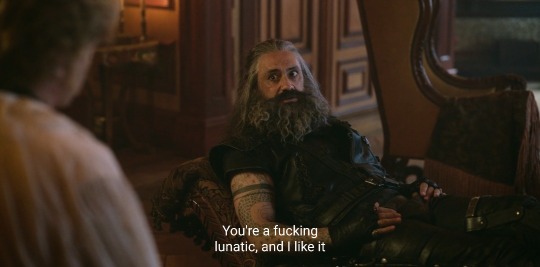
I'm going to break this into a few posts as I ramble on to the end of 2x7. I have big thoughts on the ending, but I need to lead up to it! I am going to try to be as brief as I can up to the lead up, but I'm not happy with certain parts of the fandom right now (it's just a spat, love you all).
(If you haven't seen the "I hate Stede!" and "I'm so mad at Stede!" posts after 2x7, I am so, so jealous of how you have curated your social media experience.)
Part 1: Season 1
I'm going to note first that this is really a more rambly companion piece of this:
In time budgeting, most of Stede's character introduction and motivations are built into 1x1 through 1x3, but you all know it is a common refrain of these episodes: "Just wait for episode 4!" (OK for newbies, but huge side eye from me with people who have watched multiple times.) Episode 4 is when Act 2 of 3 of Season 1 begins. The foundations of the story have been laid, the cast has been fully assembled, and we enter the rising action (i.e., the meat) of the story in 1x4. It is not that Blackbeard alone improved everything: it was the story structure itself that shifted.
Preferring Act 2 (ep 4 to mid ep 8) and saying Act 1 was bad and "boring" is a disservice to the story and really robs yourself of the payoff action in Act 3 of Season 1 (and now Season 2), in particular with regards to Stede's character. It's a TV show, so you don't have to like all parts or watch it equally, but if you're going to criticize Stede and what he does, you can't ignore the part of the story that tells you the why of everything.
For example, we see people saying Prince Ricky is "exactly how Stede used to be!". Episode 3 disagrees.

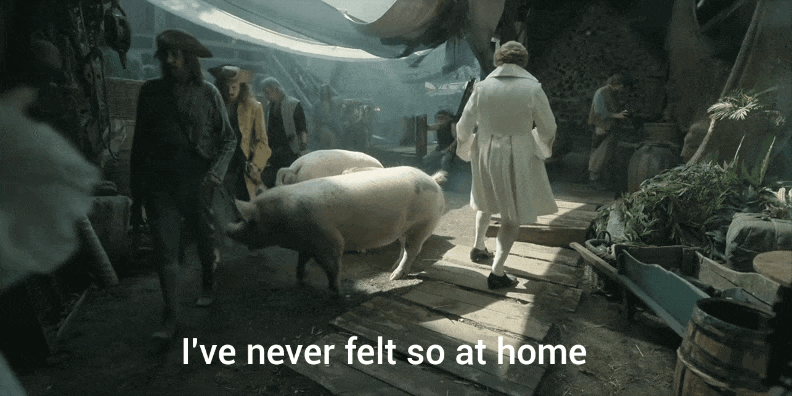

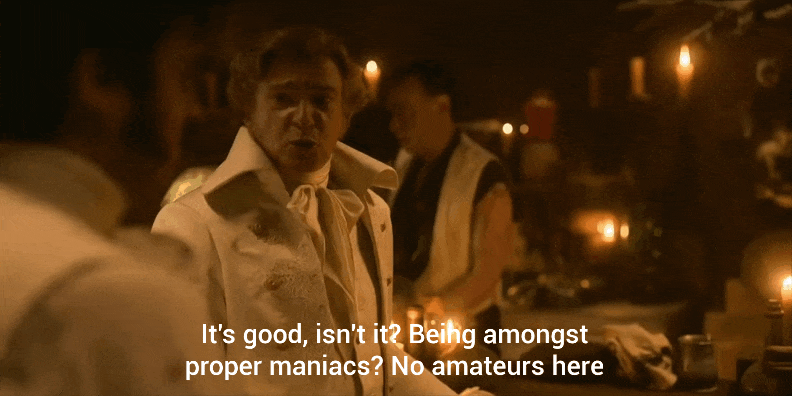
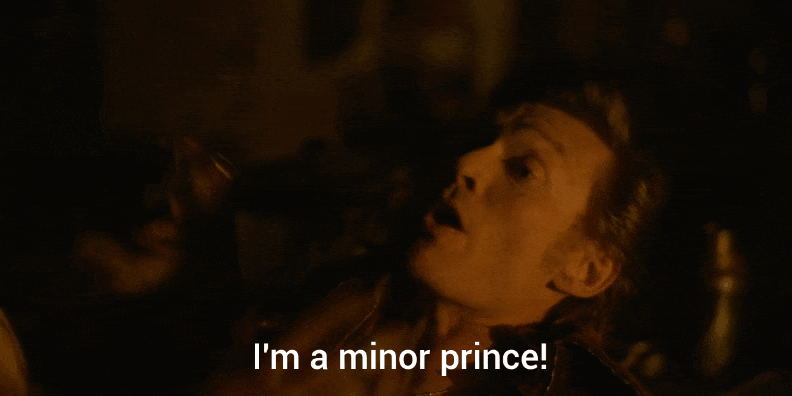
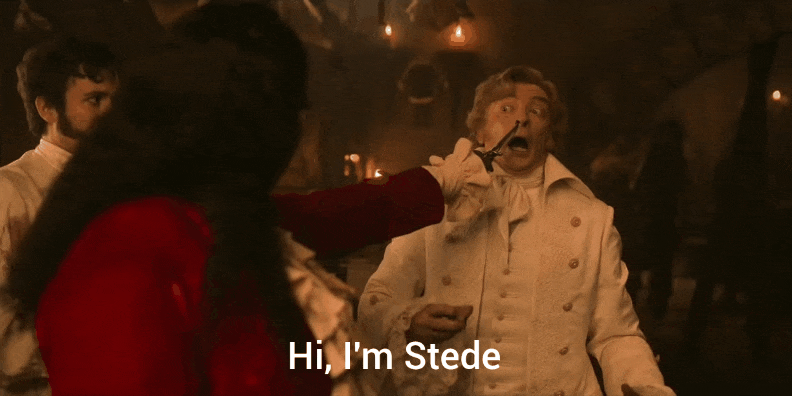
Ricky is some Evil Star Trek Mirror Universe version of Stede, and they have fundamental differences in their view of piracy, which feeds into the action of the tail end of Season 2: Stede wants to be part of the piracy world, but Ricky thinks he's above it. The few hours in 2x7 that Stede spends enjoying being cool in the Republic of Pirates is overall sweet (sliding past the murder, lol), not a relationship red flag or Stede being a dick. If you tried to join a group and they finally embraced you, how would you initially act? Being excited for a few hours does not mean Stede has made a forever commitment to piracy and not Ed.
But, I digress. To me, Episode 2 (along with 6, 9, and 10) is far and away the peak of Season 1. We see the crew bonding (and those unique interactions are missing in Season 2's truncated runtime), and we get a deeper look into Stede's head: his initial naivety toward violence, his insecurities, his unique captaincy style and problem solving. If I look at just his insecurities, Badminton's Ghost is Stede talking to himself (like Hornigold was vocalizing Ed's feelings in 2x3). Stede is harsh with himself about his abilities and maturity, and we even see that he took Badminton's petty body shaming in 1x1 to heart.

(Oh, I have thoughts on Stede finally being told he's pretty and then instantly dumped!)
But he continues to degrade himself.
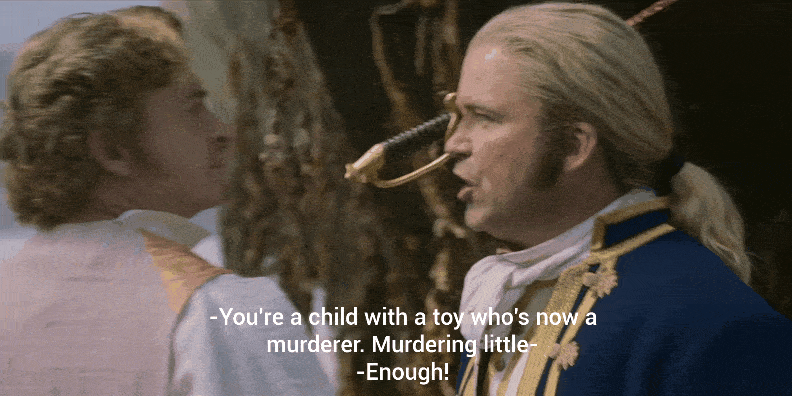
"You're a child with a toy" Stede says to himself. Compare this to Ned Low calling him a "bumbling amateur" in 2x6. Real people voicing these thoughts (like Chauncey in 1x9) messes Stede up.
The local therapist clearly lays out the motivation behind 1x9&10, and Stede still continues with the negative self talk.
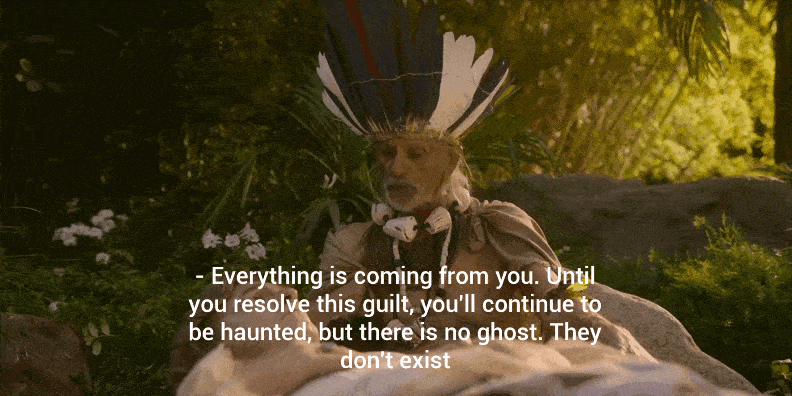
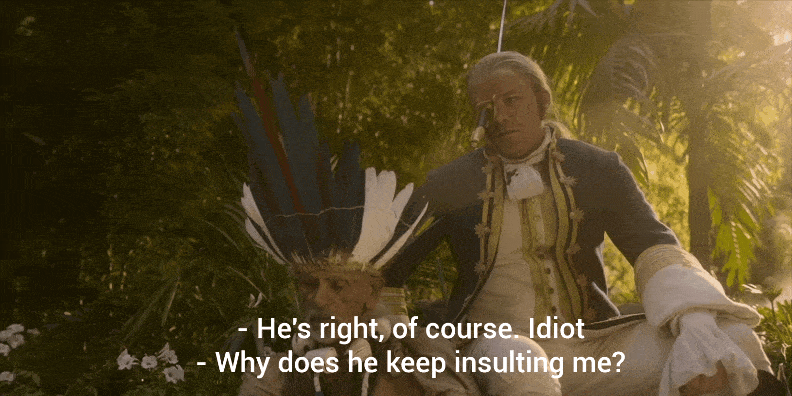
And then we get the best mantra!

Yes, baby! You can only be as good as you can be, and you deserve the world.
Stede does not banish his guilt that is haunting him, but Ed comes in at Episode 4, and any more serious feelings is all about Ed.


(Second GIF is a joke. I know it's important to Ed's character. Plz, don't be mad.)
Ed is the deuteragonist, and the story now needs to spend time establishing Ed's character and motivations. This doesn't make Stede's go away, but if you only watch Episode 4 and on, that's what it looks like. There are brief moments of Stede's vulnerability and guilt from then, but not much.
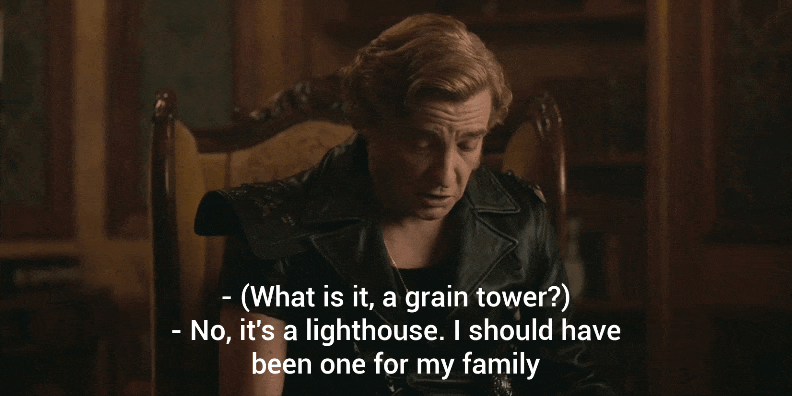
(Side note from a Midwesterner: I've spent too much time finding out if "grain tower" is colloquial for "grain silo" somewhere, and I still don't know.)
Ed and Stede just met here. Ed isn't absorbing much of Stede's comments (Stede also feels trapped, Stede has family guilt, etc), but it goes the other way, too, doesn't it? Stede is recovering from his gut-stab, they're still in a life-or-death situation, and Stede is still feeling his guilt (and just saw more guilt ghost hallucinations). Registering and internalizing what Ed is saying doesn't take priority.
And they enter their cute early relationship phase: They have fun together! They can easily talk to one another! Stede easily forgives Ed wanting to kill him!
Again: in between all the cute and fun, all the heavy stuff is about Ed. Stede deals with the aristocrats who mocks Ed. Stede is gentle with Ed's red fabric. Stede listens to Ed's past without judgment. Stede openly accepts Ed as a friend. We don't see Ed engaging with Stede in a reciprocal manner.


(I was so delighted when Stede called some of this out in 2x4.)
Stede is a few steps behind in their relationship: He doesn't know it's a romance. He doesn't know he was flirting with Ed. He's not immediately understanding what the Act of Grace was to Ed (hubby commitment!) as he's having his Nigel guilt, family guilt, and being seconds away from death swamping him all at once.
In the academy, Ed isn't even listening to Stede. He's moved onto his domestic marriage role while Stede is dealing with his demons.

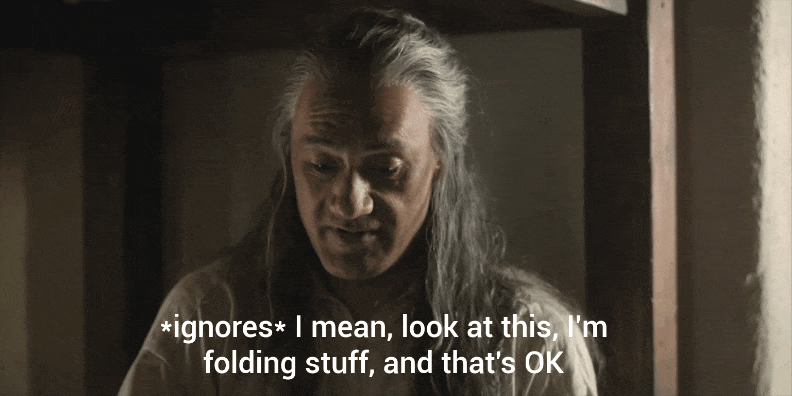
With 2x7, I see people saying, "Ed was very clear in wanting to leave piracy!" If he was speaking to someone fully engaged with him, I would agree. (That also doesn't make Stede having a few hours' fun the worst thing ever.)
(Aside of what I see below: In Season 2, I see overwhelming praise of Ed and Izzy's performances and very little on Stede. This is not to disparage TW or CO, but Ed and Izzy are more in-your-face and obvious with what is going on internally in their scenes and they are nailing the drama scenes. However, Stede becomes quieter, shutting down into himself, when having high feelings, and RD's acting is very subtle and very beautiful in these moments.)
In The (First) Kiss scene, Ed is clear! He just wants to be Ed, and Ed is happy just being with Stede.

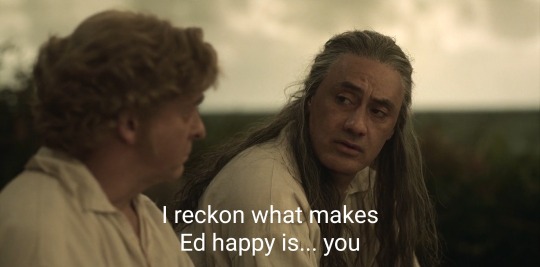
But look what Ed walked in on:

Ed is saying things, but Stede is trying to process big feelings of his own at the same time. Stede is there self soothing, still thinking about what Ed ignored him about in the bunks. "How are you handling things so well?" means Stede isn't handling it well. Ed is excited, but he (and apparently some of the audience!) is brushing off all of what Stede is saying while expecting Stede to take to heart everything that Ed is saying. (I mean, the beginning of S2 shows why Ed is so excited for this life change, but it is frustrating!)
If you only feel bad for Ed at the end of 1x9, please try to imagine Stede's perspective: suppose you have low self worth and are consumed with guilt about people you've hurt and then are seconds away from death twice, are you going to be thinking clearly and prioritizing (and recognizing) the feelings of a guy you've known for a few weeks and didn't know you were dating?
Stede has drawn inward this whole conversation. His answers turn monosyllabic, and his body language turns more and more panicy as the heavy reality of everything sets in.
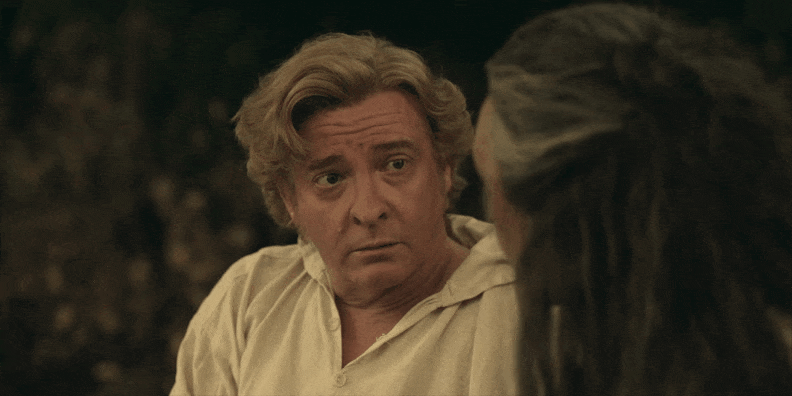
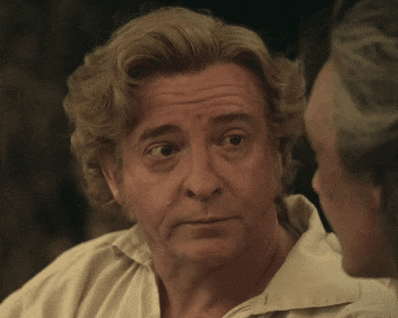

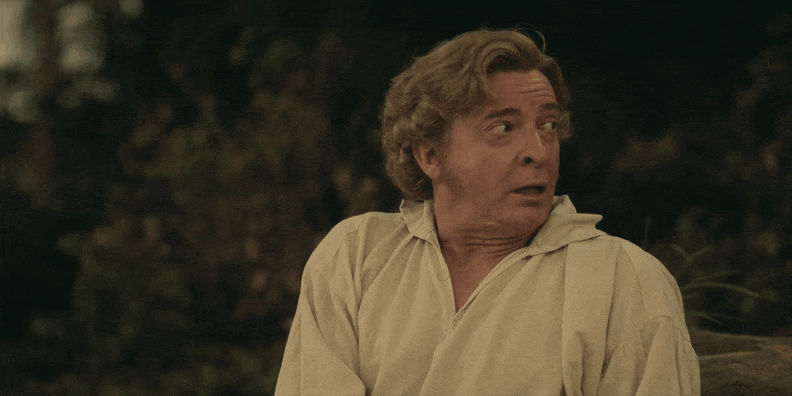
Stede enjoyed The Kiss, but was this the appropriate time for him? (Like Ed enjoyed The Sex, but was that the appropriate time for him?) They aren't in sync yet, but that doesn't make one party's feelings more valid than the other's or one party evil for being a bit ahead.
With 2x7, I don't know why people thought Stede should be a mind reader and be able to quickly piece together a few statements Ed made while Stede was mentally drowning.
I think it should be noted that as of the end of 2x7, Stede is the only crew member who hasn't had mental reflection and/or therapy in Season 2. He realized Mary, Alma, and Louis didn't need him and he was in love with Ed in 1x10, but the voice calling him a child with a toy, an idiot, weak, and ugly is still there.
Continued in Part 2! (Still to come...)
#stede bonnet#stede did nothing wrong#our flag means death#ofmd#ofmd s2#ofmd 2x07#ofmd s2e7#blackbonnet#gentlebeard#ofmd s2 spoilers#ofmd spoilers#rhys darby#Baby's first attempt at GIFs#ofmd meta
206 notes
·
View notes
Text
So I’ve been thinking about my earlier post (idk how to link posts 🤷🏻♀️ so it’s the one about Zheng) and I’ve been trying to figure out her character arc. Because she’s not in the show a lot and I know there’s more there that got cut for time. I’ll be honest and say I never fully understood why she went to Ricky for her plan or what her full motivation was. I have some theories but I’m trying to piece together an arc using the gaps in said arc so it might be rough. So if you disagree please let me know because I’d love to discuss this more.
I love Zheng and I think she deserved more screen time in season 2. I tend to believe that Zheng does operate with good intentions overall, but when the point was raised about some of her totalitarian tendencies I had to restructure my view of the character. Because we don’t see much of her I use the little we do see and what other characters say about her to form my opinions. But there are different ways to interpret things and I go back and forth on what is actually going on. For example, her “join me or die” line is interesting. I took that line as a woah harsh, but that’s just piracy. We as an audience have to adjust our standards of acceptable behavior towards what is common for pirates. On the other hand that line indicates that Zheng doesn’t let people walk away from the table. And her recruitment of the Republic of Pirates is in a similar vein. Again, as a viewer I took what she was doing as kind of a pirate union, because of her demand for a livable wage as well as Olu, Jim, and Archie’s positive reaction towards it. Of course it’s also extortion by a powerful crime boss, which is far less wholesome. (Even though extortion of the British Crown is rad as hell.) I believe that these two opposing views are in a way both true and intentional of the writers.
Which brings me to Ricky and Zheng. I was caught off guard originally when I saw them meet together and initially brushed it off as “plot stuff that needed to happen”. But I think there’s something there. In many ways there are parallels between Zheng and Ricky, they’re both in charge (kinda for Ricky) of massive fleets and they both are striving for even more power. In Impossible Birds they have similar lines Ricky calls people rubes who don’t know the puzzle chest is valuable. And Zheng in the same episode says “you people know so little” in reference to the same chest. While I believe Zheng’s statement comes from her years of experience, Ricky’s is very obviously classist. She’s a character that is on the path to becoming like the people she hates. If she got that power she could very well turn into that authoritarian leader who only cares about power. But it’s her interaction with the crew and her relationship with Olu that is going to pull her back. We see her appreciation for Stede and the crew grow throughout the season, whereas she rejected and mocked it at the start. The destruction of her fleet was necessary and I don’t think it’s going to come back.
Which leads me to season 3 predictions. Cause the shows coming back and no one tell me otherwise. Zheng’s goal is to get Ricky and rebuild her fleet. I think Jim is going to play into her arc a lot during this season. They understand wanting Revenge and will probably push Zheng to appreciate the people around her, like Olu. Her ultimate arc (fitting with the theme of the show) will be about realizing the error of her ways and understanding community and softness. My theory on kind of how this happens is they’ll meet Captain Henry Morgan. I’ve been listening to Howard Pyle’s Book of Pirates at work and it gave me ideas. Captain Morgan has a fleet to rival Ricky’s and I can see them enlisting his help to get revenge. He also is a piece of shit. He stole money from his own men and fucked off and is still regarded as a great pirate. I can see him being like a Mr. Beast type, where he’s a cult of personality that cares little for other peoples safety but he still has a rabid following. It’ll be a great parallel as to what Zheng does not want to become. We’ll also get to see how pirates typically operate (Stede and Zheng are the exceptions) which will provide more context to Ed’s Kraken era. It’ll be a great way for the show to say how different Ed was truly operating in regards to pirate culture. I think it’ll be similar to his Kraken era but the confirmation will be nice to get.
Anyway, let me know what y’all think cause I’m spit balling her and I’d love to discuss.
#ofmd#our flag means death#gentlebeard#ed teach#stede bonnet#ofmd season 2#ofmd meta#zheng yi sao#prince ricky#ofmd theory#ofmd season three
8 notes
·
View notes
Text
I don’t know how much of it was intentional, but I find it interesting that this mini-crossover with Deep Space Nine was also an “Orion epiosde” (if you can call it like that).
I’ve realized long time ago that the Star Trek shows are often delving into cultures of certain ST races, due to supporting or reaccuring characters coming from said races. These characters helped to make those cultures a bit deeper. We never saw Klingons the same way again after commander Worf; and we certainly looked differently at Ferengi after all those “Ferengi Episodes” of DS9.
I was kind of hoping that Lower Decks will do the same for Orions, because of Tendi... but so far we keep on repeating the same theme of Tendi not wanting for her culture to be associated with piracy and thievery, even though (aside from the holoprogram in the pilot) we only see this pirating and thieving side of Orion.
But see, in today’s episode we meet Mesk, an Orion who was raised by humans and all his knowledge of Orion culture was taken from holonovels. He is proud of his culture and tries to have some kind of connection with it... but he has very shallow view on it. So much so that Tendi - who wants to distance herself from this part of her heritage - is slowly growing annoyed by it.
Now, TVTropes compares it to Worf’s situation, because he was adopted by humans too and tried to maintain connection with his Klingon roots. However, I would argue that we can also compare it to Quark’s situation (at least to some extend).
Because what’s Quark’s situation on DS9? He, his brother and nephew are far away from Ferenginar, on a station currently ran by Federation. Often, throughout Star Trek: Deep Space Nine, he tries to maintain old Ferengi traditions, especially in regards to Nog, but he keeps on finding himself acting very human-like, i.e. against his better interest. It also gets him in trouble with FCA, because for Brunt Quark and his family are cultural traitors.
At face value, Ferengi culture displayed and maintained by Quark is very stereotypical - it’s all about profits and business and opportunities, with shades of ruthless capitalism and misogyny. However, with each “Ferengi Episode” we get to see non-stereotypical actions and deeds from Quark, Rom, Nog and other Ferengi. We get to see them not as just greedy gremlins; and see some nuance in their culture.
Now, let’s get back to Mesk. He is enamored by this stereotypical depiction of Orion, but he didn’t have much opportunities to interact with other Orions who have better view on their own culture and can teach him about it. Maybe he knows some Orions in Starfleet Academy but there is no Orion diaspora on Deep Space Nine. Tendi is the first Orion who actually gets him a taste of Orion pirate culture. Interestingly enough she actually wants to run from it. It also helps her understand that she doesn’t have to be ashamed of it.
#star trek lower decks#lower decks spoilers#lower decks#d'vana tendi#mesk#star trek deep space nine#deep space nine#ds9 quark
64 notes
·
View notes
Text
Current thing making me insane: Flint’s accent.
So we know extraordinarily little about Flint’s early history, really. Raised by grandfather, fisherman, from Padstow. That is a very specific location to give us, given vagueness of everything else.
The interesting thing is, Padstow is in Cornwall. The Cornish accent is by far one of the most distinct British accents, you would absolutely recognize it. And one of the main things you might recognize it from is that it is the basis of the ‘stereotypical’ pirate accent (thanks Robert Newton 1950 TI adaptation Silver). That’s how Flint would have spoken growing up, and he clearly erases all traces of that accent and is doing this very generic upper class London accent by the time he meets Thomas - a natural part of becoming educated/passing as a gentleman/etc, plenty has been written about that. Flint was not the first transformation in his life, Lt. McGraw was equally created.
Point being, when he ‘created’ Flint, it would have been VERY easy to revert to an earlier way of speaking to blend in. But he makes the choice to keep outsider status. His vibe remains very much ‘officer and gentleman who has turned to piracy’ rather than ‘naturally a pirate’ although he probably could have picked the latter if he wanted.
Why? Hm, I started but it got long. Flint and maintaining outsider status is perhaps a separate post. For now I will leave it at: probably some combination of perceived superiority, self punishment, and Miranda.
[I do acknowledge that Black Sails doesn’t actually do that accent pirates much anyway. I think some of it holds just in terms of class differences though, and still an interesting choice]
#man doesn't actually want to be a pirate is all i'm saying#he doesn't particularly seem to want the money for its own sake#or enjoy the lifestyle#he genuinely thinks that given justice and freedom the pirates would go be farmers and tradespeople#missing the point that other people seem to realize#which is that piracy is fucking fun#this whole thing highlights some of the differences between him and Vane#also hilarious that mr john 'i dont want to be a pirate' silver#is much better at it#how different characters on this show view piracy is so interesting#almost nobody cares about 'lets go take some stuff from that merchant ship over there'#its all freedom#or legacy#or revenge#james flint#black sails#can you tell i'm avoiding my draft?
390 notes
·
View notes
Text
Reasons not to be a lighthouse
So, I want to talk about the lighthouse, and what it means for Stede to be the lighthouse.
I’ve seen fanart that frames the lighthouse/kraken imagery in a light vs dark, oppositional way. Like Stede is a light that needs to rescue Ed from the dark. And jarring with that use of the imagery made me realise that I see these symbols completely differently, not in opposition but in parallel. To me it follows that if the kraken is Ed at his worst, then the lighthouse is Stede at his worst.
It’s easy to see the negative attributes of a kraken (frightening, violent), but the negative attributes of a lighthouse are less straightforward (yes, you can get smashed on the rocks, but what exactly does that tell us about Stede?).
When I considered it, it brought to mind the apocryphal tale where two nations are in contact by radio at sea. They each demand the other divert to avoid collision, going back and forth until one country says “This is the biggest, most heavily armed warship in our country’s big and heavily armed fleet. We demand that you divert course or we will fire upon you,” at which point the other country says “This is a lighthouse. Your call.”
A lighthouse is not going to divert course to avoid a collision. It’s going to stay exactly where it is, and if you don’t divert course to accommodate for it, you’re fucked. A lighthouse is a perfect metaphor for obstinance, for inflexibility. Stede can be bad at taking other people’s perspectives into account and adjusting accordingly. At his worst, he can’t even take in that other people’s perspectives may differ from his in the first place.
We see this with his family. He wants to uproot their lives and go to sea. He presents his dream as a present to Mary, and assumes she will be just as thrilled as he is, because he’s too wrapped up in his own excitement to connect with Mary as a separate individual. The dialogue then explicitly tells us how Stede is unwilling/unable to hear Mary expressing her perspective/experience:
Mary: "You know I hate the ocean. I said so just the other day."
Stede: "What? When?"
Mary: "When we were standing by the fucking ocean."
Mary isn’t upset that Stede has an interest in sailing, she is upset that Stede has no interest in actually knowing her, merely trying to fit her into his own interests. The scene where Mary repeatedly tries to get Stede’s attention and he ‘Mmm’s without looking up from his book also show us how he does not respond to her attempts to communicate. It’s telling that when she presents her anniversary present to him, Stede does not know Mary paints. (Honestly, I would find it completely in character for Stede if she had mentioned her painting to him several times in the past, but he just hadn’t taken it in because it’s not what he’s interested in.)
Which takes us to the consequence of this inflexibility: the lighthouse is isolated. Stede is so inflexible at times that he cannot forge the back-and-forth communication required to actually connect with other humans.
We also see this at the start of the show with his crew. I think the underlying reason that the crew wants to mutiny is how Stede cannot see things from their perspectives or accomodate for them.
Stede went into piracy with no experience, and decided to impose his own views on how to do things on his crew, without seeking to first learn from them about an area in which he has no experience. Throughout the first few episodes we see Stede trying to push his crew into being the people he expects and wants them to be, rather than trying to get to know them.
In the first episode, in the ‘talk it through as crew’ call and response, we see Stede (frankly, quite patronisingly) trying to push the crew into adopting his perspective and participate the way he wants them to. We hear Stede narrate "I pay my crew a salary. Same wage, every week, no matter what. Course, it took them a while to come 'round to the idea", and while Stede probably thinks he’s doing what’s best for them and they just can’t understand that, consider what difference it makes to the power dynamics if the results of everyone’s work are shared versus if they are completely dependant on Stede. Consider how Stede is disbelieving when Lucius says he’s the only crew member who can read ("That's not. Is that true?"), dismissing this input to the point that a couple of episodes later, when he tries to replace Lucius with Frenchie, he is surprised to discover Frenchie cannot write.
When Stede decides that the crew should vacation in episode two, he says explicitly "Your time is yours to do with as you please" and "There's literally no way to mess this up." He then almost immediately starts telling the crew what they can and can’t do, responding to their methods of unwinding with "That is NOT what I was talking about!". You’re not allowed to spend your downtime roughhousing, becasue Stede does not enjoy roughhousing. Stede’s preconception of himself as a captain is that he is accepting and he listens, but the actuality of his captaining style is that he tries to push his crew into complying with his preferences.
In the third episode, Stede is completely unwilling to learn from his crew – most of whom have visited the Pirate Republic before – about how things work there. When Lucius tries to advise him (repeatedly) he dismisses it (repeatedly).
If the kraken represents a toxic masculinity aligned with aggressive and threatening behaviour, then the lighthouse represents a toxic masculinity aligned with is mansplaining, blind confidence and the assumption of authority.
In episode four, their meeting starts Stede and Ed’s arc of mutual character development. I think it’s a crucial moment in Stede’s development when he excitedly presents Ed with Stede’s preconception of who Ed is – a picture of Blackbeard from one of his pirate books – and Stede actually sees and takes in Ed’s response. Stede listens to Ed. And after having listened, Stede adjusts his course. While Stede’s perspective is firmly that being Blackbeard would be great (he says that he’d give up everything for just a day of being Blackbeard), what he says to Ed isn’t encouragement to keep going, insisting that surely Ed’s life is amazing. Instead, it’s: "Look. I can't believe I'm saying this, but have you ever considered retirement?" This might be the first moment in the show where Stede is considering things from someone else’s perspective. And that’s the start of him being able to reach past his previous isolation and actually connect.
Stede still struggles at times with seeing past himself for the rest of the show, but episode four is a turning point. It introduces his capacity to change and a new willingness to learn.
For the rest of the show, we see Stede succeed when he stops trying to be the isolated beacon that gives detached direction, when he can see past his preconceptions, connect and adjust, and we see him fail when he can’t. In episode five his moment of triumph is rooted in a moment of connecting with and listening to Frenchie. When Frenchie expresses his experience – “I was in service for a minute so I now the lay of the land and trust me, servants, they see everything. This lot, they're not so fancy” – Stede actually takes it in, and that gives him the idea to ask Abshir for the information that Stede builds into his passive aggression bomb. In episode six Stede comes pretty close to explicitly naming the problem and solution himself: "I'd like to apologise for my behaviour earlier. As total as my theatrical knowledge may be, I did forget the most important thing: company!"
I think what takes the crew from where they started at the brink of mutiny, to the intense loyalty they have by the end, is not a change of heart on their part, but Stede changing. Stede softening his dismissive streak, starting to genuinely rather than superficially listen to his crew and to respect their input.
When Stede feels he needs to be the lighthouse, he feels he must be the guiding light all on his own. He can’t have his guidance questioned, because then he’s failing in his role.
I think this sense that ‘knowing best’ is supposed to fall entirely to him is one of the reasons why he feels so guilty about leaving Mary: he is supposed to be her guiding light, so surely without him she must be lost? Surely, without his light, his family have been smashed up against the rocks? It is his sense that he has failed in his duties at being his family’s lighthouse that makes him falter at the crucial moment when he leaves Ed. Stede seeing that actually, his family are just fine at finding their own direction (and Stede finally, finally, listening to and allowing himself to be changed by Mary) is what shows him that he doesn’t have to be the lighthouse.
I don’t think he returns to his crew as a guiding light. I think he returns ready to adjust course as he goes, with his crew’s support and collaboration.
#ofmd meta#stede bonnet#our flag means death#ofmd#I was going to add another section about how Ed is the counterpoint to this#how (as others have explored in excellent meta) Ed is too flexible to others in contrast with Stede not being flexible enough#and how I understand that with the overall lighthouse/kraken symbolism#but I think that might be a whole other meta because this is already pretty long#my ofmd meta
2K notes
·
View notes
Text
rewatched ofmd 1.09 and 1.10, and here are some random thoughts!
MAN, 1.10 is such a great episode of television. so funny, so poignant, so upsetting, and the way it allows us to hang out in mary’s point of view for awhile is so refreshing and enjoyable. it’s SUCH a great close to the season. i wish it could win awards. it SHOULD win awards!
i am obsessed with the widow evelyn and that post that said she and spanish jackie should meet will haunt me forever now. i’m not saying i WANT mary and her widow squad to turn to a life of piracy, but if for crazy plot reasons they wound up temporarily drawn into pirate adventures, i would be so, so happy. i also feel like mary is just too great a character to not see again.
it’s so striking how mary plays the same role in stede’s life that izzy does in ed’s in this ep, to completely opposite effects. (a spouse and a first mate aren’t so different, in a way!) i think the reason stede is able to forgive himself and move forward is because mary has the grace to be happy for him, embrace him as he is, and sincerely wish him growth and good things even after he’s hurt and bitterly disappointed her in the past by not being able to be the man she needed him to be (a proper, loyal husband). meanwhile, we have that scene with izzy and ed where izzy basically has the same grievances with ed -- he was promised one thing (blackbeard!), he devoted his life to one thing (and in a subordinate position, similar to a wife in a marriage of centuries past), and when ed couldn’t hold up his end of the bargain because ed wants to be ed, he got beyond pissed because the whole foundation of his life is therefore shattered. stede had support from the person who knew him best as his old self and ed didn’t and that made all the difference. mary said, “you don’t have to try to be this anymore since it’s not working” and izzy said, “if you’re not what you were, it would be better if you were dead.” (which is extra disturbing for a character who we see with some degree of suicidal ideation when we first meet him.)
i just can’t unsee izzy as an echo of ed’s abusive father, which is why i think his words cut so deep. he is SUCH a vile and disturbing character, aaaaaaaaah. great job making me hate you, con o’neill!
i was also struck by the visual parallel of ed putting the kohl on his face to become ~the kraken~ with stede smearing the pig’s blood all over his face while faking his death, and how those moments mark them going in completely opposite directions (ack, my heart!): stede’s doing it to be able to kill off his old self who he never felt right being, where ed is totally regressing and trying to completely cover up his new self with his old one.
i continue to feel like ed’s descent into mad-bad-dangerous-to-know-ness is less about stede ghosting him alone, and more about how badly he yearns to be his true self and how completely unacceptable he feels it is when stede isn’t there to give him the confidence, now that izzy has planted the idea that his real self is something completely shameful.
god DAMN the writing on this show is so smart and layered and psychological and interesting. it feels so good to watch!! my brain is happy! and my heart is suffering. come onnnn, hbo max!
178 notes
·
View notes
Note
As someone who is nebulously in the “Izzy is a bad person/ not an Izzy fan” camp, your posts have helped me realize something pretty important. A big part of why I hold those opinions is because I view Izzy through the lens of symbol and allegory rather than complex personhood. Maybe that’ll change in season 2 as we learn more about him, but as of now I think that’s a big reason why I and many others are quick to judge and excuse wrong doing against him. For some it’s simply difficult to connect with him as a character, and much more accessible to see him as a reminder of hypocrisy within the queer community. Hell even a reminder of that one old friend who for whatever reason just CANNOT let the fact that you’re growing as a person go.
I don’t know, what do you think about the concept of there being a difference between analyzing characters as people and analyzing them as representations of larger societal issues?
Interesting question...
I mean, I am a big proponent of "characters aren't real people and that's important to remember when discussing them", which does dovetail nicely with a lot of discussion on "What is this character in the story?" And a character being a symbol or representation of something else abstract or systemic is a perfectly valid option. Nigel Badminton, for example, has a twin brother who loved him, but absolutely none of us give a shit about how his death affected Chauncey emotionally because both of them are really just symbols of oppressive societal power / Stede's childhood trauma / bullies in general / etc. The show only cares about their deaths insomuch as it affects Stede, and Stede literally admits he doesn't even feel bad about it.
They are such straightforward examples of narrative tools all the way down to their deaths, which are pure symbolism via black humor. Like, Nigel falls on his own sword because he can't stop mocking Stede to take him seriously for two seconds, and Chauncey shoots himself in the head the moment he fulfills his role in Stede's story because it's a hilariously dark joke that this happened to Stede twice.
To take this to Izzy however... Ok, so three major questions once you think a character is representing something:
What is this character representing?
What is the story trying to say about it?
How direct is the represention? Or to put it another way: How much of a person are they vs just a symbol?
Because most characters with any decent amount of screentime are going to naturally become more "people" than "symbol". It's not an either/or situation. OFMD creators have been very open about how the show is looking at toxic masculinity, for example, so I think it's pretty safe to say Izzy is the character on screen most pushing that mindset via the abusive pirate culture he's firmly planted in. I also think the show has a lot to say about classism, and Stede is pretty obviously the designated character for that. (I also think Lucius is, because he's kinda picking up the furthest extreme of Stede's version of piracy just like Izzy is Edward's, but that's a meta a little to the left of what you asked.)
But Stede is a lot more than just "rich guy", and despite the fact you don't exactly root for the rich guys in classism narratives, we are supposed to root for Stede. His arc is about learning. The show's message is broadly not upper class positive - look at the French partiers - but Stede can escape it in a way they can't because he's also a character in his own right, and the show's overriding theme is about growth.
I think Izzy is certainly complex enough to be a character, unlike the other antagonists who are kept mostly offscreen. He has a major connection to one of the mains, which tends to automatically convey a level of depth. He also just... doesn't function effectively as a pure symbol of oppression, because he's not bad enough. There's so many writing decisions where it would have been so easy to make him worse. More aggressive. More textually bigoted. More directly harmful. And they didn't. (...Fuck it. Linking to that time I said this and got immediately blocked.)
An example that's been getting me recently: In his very first episode, why didn't Izzy steal the hostages? That's like basic antagonist setup. Especially for people that think overt racism is at play here at all (I very much do not) it would be the simplest thing in the world to have him steal them from the natives for some stupidly easy early work on that front, and establish it with a line of dialogue. Instead the line we get is "Oh, we sold them to some guys." They had him pay for them.
And all of this I think ties back into that second question of "what is the show trying to say," because I do not think the answer is "Izzy is just our stand in for bad people and we do not care about him." Especially not if he's the designated representation of toxic masculinity, because I think Izzy-as-a-character is clearly suffering under toxic masculinity. He's specifically also a victim of the system, and it's kind of a fucked up and pessimistic message to say victims of a shitty system deserve to be written off as a comedic punching bag and die unhappy. Isn't it better thematically if he's a person like Stede who can learn to be better???
We're in a world where Edward's backslide into the toxic masculinity aligned system starts with 7 attempted murders + mutilation and abduction, and we're going to forgive this and give him a happy ending. At this point the show's message is approaching incoherent if Izzy is irredeemably evil and deserves to suffer.
#our flag means death#i feel like there should be a cut in this but i didn't know where to put it so...#also i skimmed past question 1 because it's both really simple and really complicated#but like. there is a reason there's so much debate on what exactly izzy represents and it's entirely possible he's just not meant to be X#(for example - homophobia. the writers have said they downplayed its importance in the show and izzy is the main onscreen antagonist)#(that plus how much i dislike the implication of edward being close to someone bigoted against him means i just don't see it)#i joked earlier today that we're all just gambling on our interpretations of izzy being the right ones until season 2 drops#and like. we kinda are 🤣#izzy hands ofmd#character arcs#ask#anon#ladyluscinia#doylist vs watsonian
46 notes
·
View notes
Note
hi I know we haven't talked before but I was wondering what you thought about legacy in black sails? you may have covered this before and I'm sorry if I've missed it, but you always have such interesting meta. I'm trying to write a fanfic set post canon but I'm struggling with this aspect. you don't have to answer if you aren't comfortable with it. sorry to bother you. :)
Hello!! Yes I can absolutely talk about legacy
There is honestly so much to unpack with just with that one word but I’ll do my best to keep this relatively coherent.
1. Nassau and the War
Black Sails, however much of it is literature and mythology, is also historical fiction. What makes this interesting going in is that we already know that 1) the Pirate Republic will fail and Nassau will return to civilization*, 2) there is not going to be a massive pirate-slave rebellion that topples the English Empire, and 3) piracy will be almost entirely quelled by the 1720s. While on the small scale the show plays around with historical accuracy, these larger events are predetermined. This is a major contributing factor to the tragedy of Black Sails: the pirates are doomed to lose from the very beginning and will be remembered as the villains. The legacy that Flint in particular worked so hard to make possible is killed in its cradle. Flint understands this perfectly well, hence the “all of this will have been for nothing…” speech.
*On a side note, in a dark twist of legacy, Thomas technically does get exactly what he hoped for in 1705. Through universal pardons the Bahamas Territories are restored to peaceful colonial rule. Good… right? Let that one ruminate.
2. Perceptions of Piracy
So yes, pirates will never be remembered as the revolutionaries who showed the world that there is freedom in the dark. They will be remembered as violent, lawless criminals. However, this so far has ignored one key point about their legacy: everybody fucking loves pirates. Sure they’re villains, but they’re villains in the fun way that we envy. If other characters don’t get the legacy they hoped for, Jack Rackham sure does. Think for a moment about how amazing it is that 300 years after he was alive, millions of people all over the world fly his flag. Piracy has been permanently cemented in popular culture in a positive light - representing nonconformity and freedom especially to groups that perceive themselves as outsiders (ex: the queer community). So, the pirates have won after all, haven’t they? I suppose that begs the questions: what does it mean to be remembered as the monsters in the stories they tell their children, if the monsters are the most beloved part?
2. The Narrative
Alright. We’ve covered historical legacies, but as we all know, first and foremost Black Sails is a prequel to Treasure Island. It’s a predetermined legacy of an entirely different kind, but actually does relate to quite a lot of the history covered. One of the main reasons we’ve come to love pirates is because of Treasure Island and other stories inspired by it. Long John Silver is one of the most famous and recognizable names in literature - contributing as much if not more to our modern conceptions of piracy as the “real” pirates. Silver struggles throughout the series with his views on legacy. His growing popularity and role as King are intoxicating, but at the same time the idea of being Known and tied down to a single identity is deeply unsettling to him. When he betrays Flint, he claims he doesn’t care if he’ll be remembered. Regardless of whether that’s true, he absolutely will be remembered. Because he’s Long John Silver. And because Flint is right: he left the proof that he mattered buried on that island, and although at the end of the book he doesn’t get the treasure, by participating in the story he leaves (whether he realizes it or not) with something else: his legacy.
Obviously there is so much more to discuss here, but for now I’ll leave it at that.
#i hope this is at least tangential to what you wanted me to talk about#i feel like a teacher getting emails about a book i assigned and i love it#black sails meta#black sails
55 notes
·
View notes
Text
How Stede Bonnet reminds me of Don Quixote
Disclaimers: I read two (2) chapters out of Don Quixote in my high-school literature class, and the only stuff i know about the story is pretty much from there (first and eighth chapters, if any of y'all are interested). Also this is 100% about Stede Bonnet the character and the way he is written in the show, and not in any way about the historical man. SO!
There are a few elements to this - the obvious similarities between Stede and Don Quixote as people, including their backgrounds, approaches to the lives they chose, and the obvious incompatibilities between them and the dangers of being pirates/knights; the similarities in how the narrative itself mocks both of them, whether its the general framing of scenes or the actual narrator; and also how in Stede's case, the narrative takes a turn and pulls him away from being a Don Quixote, especially when in relation to Ed.
So about the first thing! It really is the most obvious part of this comparison - generally, they are both from wealthy backgrounds (wealthy-ish in the case of Don Quixote, I think, but the point stands), and abandoned their comfortable lives in exchange for lives of danger and adventures. It will be expanded on later but I should also point out here that there are a few differences between them in this sense - namely the reason behind Don Quixote's decisions being Comical Insanity, while Stede was always out of place in his life since childhood, whether due to full-on homosexuality or his general "softness" in relation to The Standard. Slightly more about that later! But anyway, they are also extremely not suited for the lifestyles they chose, and interestingly, once again in different ways - Don Quixote is trying to make his fantasies a reality, in a time period which is [decades? a century?] after the time when it had a chance of being relevant. He also bases those fantasies on cheap novels and clichés - which is to say, even if he WAS in the right time period, he would still be seen as a lunatic. That bit is similar to Stede's case, except that Stede IS in the right time period - the Golden Age of piracy, I'm pretty sure? He wants to join a lifestyle which does exist in his time, but what makes him similar to Don Quixote is how, like him, he has no clue how it works - he acts out the fluffed-up tropes he knows from stories, with ZERO awareness to how dirty and gruesome it gets. That's a big part of the comedy in both stories - just like how Don Quixote had a stupid, kinda dangerous duel with that Basque guy, Stede stabs a man through the HEAD and it's still ridiculous. The tone of the story ties into how much they both absolutely do not fit the lives they've chosen.
Now that brings me to my second point - the tone of the two stories is pretty similar in how it treats Stede and Don Quixote's misconceptions of reality (here I should point out that in OFMD, the tone does change throughout the show. A while ago I read a post that explained the changes in the tone as the show progressed, and I can't find it now, but the point is that right now I'm referring to the early episodes of the show - generally until Stede gets stabbed, which, I'm pretty sure, is where the aforementioned post noted the first drastic change in the tone of the show). It's easier to explain Don Quixote's example - the narrator straight-up says he is insane, and while the other consistent point of view in the story, Sancho Panza (who, as far as I understand, is basically There for most of the story?) tries to gently convince Don Quixote he's wrong with his conception of reality, or sometimes speaks in his metaphors in order to get through to him, the narrator just mocks him every time. With no ambiguity, the narrator gives the distinct, clear descriptions of the actual reality, beyond Don Quixote's fantasies. Generally, Don Quixote is described as pitifully and amusingly delusional - while it makes him into a somewhat endearing character, he is always painted by the narrative to be, pretty much, a crazy idiot.
With Stede it's a bit different, for a couple of reasons - firstly, there is no narrating voice in the show like there is in Don Quixote, and secondly, with the shifts in the tone of the story, this image of him is not as consistent as it is with Don Quixote. All in all, it lets his character be less of a caricature and more of a relatable Human Person - the narrative never paints him as outright, unmistakably crazy, and doesn't build his character in such a way so that he is purely A Landowner Driven To Madness By His False Conception Of A Life Of Adventure. Instead, the narrative lets him actually explore the way he fits into a life of piracy, in an almost sensible way - the persona of The Gentleman Pirate is absolutely ridiculous and still doesn't remotely fit the concept of the life he's chosen, and the way he tried to actualize that persona just put him and his crew in danger, BUT the narrative still shows it in a way that makes it seem original, unique and fascinating, even if it's still out of touch with reality. And THAT'S where we get to Ed!
Ed is a really interesting way to break the Don Quixote trope for Stede, and essentially shift the whole story into a different genre - now, instead of it being purely about Stede trying to understand piracy through his twisted conception of reality, it adds the Entire Other Element of Ed's story, and his involvement with Stede. Ed doesn't fit into any side-character trope in the general template of Don Quixote, and so he basically breaks Stede out of the story he was in. There's a whole other essay to be written about the parallels between Ed and Stede and the way they inverted those parallels as they went along, but the point is - the focus shifts to those parallels in a way that takes the focus off of Stede's Don Quixoteness and his lack of touch with reality. If we take as an example the way Stede didn't know how to live as a pirate, Ed literally shows him! Not to mention how Ed brings in a whole new way of being a pirate, with an undertone of insanity and an emphasis on the desire for the fun and adventures of the lifestyle, which ties into how he sees all of Stede's weird approach to piracy as fascinating and original. Don Quixote had to recognize his aspirations of being a knight to be delusions, but through Ed, Stede gets to continue his story as a story about him actually adapting to the life of a pirate, rather than turning back. That's exactly what we saw in that shot in the final episode of the season, with Stede sailing away - his attempt to come back to his home was WRONG, and he instead needed to continue his life at sea, as a changed man. Unlike Don Quixote, who's ideas about knighthood made him ill and eventually killed him (if I remember correctly? Basically the lack of sleep, lack of food, his attempts to live up to the clichés of being a knight), and on his deathbed realized that his conception of reality was wrong, Stede instead realized that the life he made for himself, despite the unusual way he has to live it, is in fact the right path for him.
Aside from the actual way Ed taught Stede to be a pirate, their love story plays such a big part in this as it is - unlike Don Quixote, who's love was also a part of the knight act, and at the end didn't actually get romantically involved with her (I think???????), Stede's love to Ed is a big part of the driving force behind his eventual decision to return to the sea. And even beyond the layers of him being a closeted gay man in the 18th century, and how it paints in a different light his disconnection to his family and the rest of his normal life, it is also the biggest inversion to his story as a Don Quixote. It's a genuine and heartfelt storyline, without the usual parodic tone of the show, and in that way it's the final breaking point of the ridiculousness of Stede's approach to life at sea - the gradual, building romantic tension hints at the way the story will eventually accept Stede's strangeness as a good part of his character, rather than the dangerous, laughable and pitiful force that drove the story until that point; after that, the absolute acceptance of the love story as a love story by the narrative was what allowed Stede to finally escape the image of a delusional Don Quixote, and instead fully be a character who's quirks are just part of the many layers and traits he has - it's the finishing part of the transition from the caricaturistic image of Stede that was established during the early episodes, into a complex, layered character. OKAY I REALLY NEEDED TO GET ALL THAT OUT, THANK YOU FOR COMING TO MY TED TALK
#ofmd#our flag means death#stede bonnet#edward teach#blackbeard#blackbonnet#gentlebeard#don quixote#don quijote de la mancha#don quichotte#how many ways is that mans name spelled jfc#i have been planning this post for like two months#like since i studied for my literature final (which included don quixote....) about two months ago#and now the schoolyear is finally OVER#so i finally wrote this#u r welcome. or smth
7 notes
·
View notes
Note
That's fair! I think whether Sissyphobia can be considered a subtype of homophobia or it's own separate classification is a topic serious scholars could debate endlessly. I have wondered if fans are using 'homophobia' to describe different things. Honestly while it's funny to say, my bigger accuracy issue is with 'Izzy INVENTED homophobia' treated as serious analysis. Whatever his problen is, while he might stand out on the ship, he's not alone outside of it.
Oh for sure I feel like the topic has a lot of nuance and it could be talked about forever. And homophobia is definitely something that exists within our flag means death universe and not something new created by Izzy lol because it's alluded to briefly when Lucius talks about beards and how I used to pretend he was straight and things like that but I don't think that the show wants to subject the viewers to the reality of actual explicit homophobia which is a part of why I don't think Izzy is being homophobic but he also hasn't done anything overtly homophobic.
Piracy seems to be male-dominated mostly from what we see in the characters in the show, so it's most certainly affected by this toxically masculine society and I feel like we could really have like long conversations about it and the inherent interactions toxic masculinity has with homophobia.
Because toxic masculinity interacting with homophobia most certainly exist I think the way Steve grew up and the way he was treated by his peers and his father definitely was a reflection of him being a gay child who had interests that were not traditionally masculine. So I can also see from the view of being hostile towards things that are traditionally feminine interests and behaviors being seen as homophobia and really yeah there's just lots of nuance to the conversation when talking about Izzy specifically. I suppose my interpretation of it is he doesn't seem to have a problem with men being together it's more so rooted in the toxic masculinity rejection of emotional vulnerability on top of what society dictates a pirate should be which is sadistic cruel and without mercy. Because if he had a problem I think with certain characters being gay he certainly wouldn't have made black pete first mate who he knows was having relations with Lucius. But do I think the rejection of Stede and the way he does things based in the toxic masculinity could be viewed as a form of homophobia yes I just personally in the case of Izzy do not see it as being rooted in him being actively homophobic,a perpetuation of a toxic masculine homophobic society maybe, and we could go into a big conversation about it forever lol.
But my original point was that that specific scene that's been referenced did not prove Izzy to be homophobic and it seems like a good chunk of people misinterpreted what was going on and took it as evidence as to why is he is actively homophobic therefore should not be enjoyed as a character.
But in no way his Izzy invent homophobia in 1717 lmaooooo, it's definitely alluded to being a real part of society in the show
#I used text to speach for all of this#so if it feels disjointed#its bc my brain is stupid#diego.txt#im making strawberry jam rn#ofmd#izzy hands#but definitely there cld be loads and load of nuance convo abt that#even trying to type this i feel like there is simply no right answer#thank u for the ask!!#i appreciate the convo#bc it allows me to analyze more of izzys character and the show as a whole#i feel like ive talked in circles#lol#🥰💕💕💕💕💕#lucius spriggs#black pete#our flag means death spoilers#our flag means death#stede bonnet
15 notes
·
View notes
Text
Bellamy’s illusions (Symbolism)
Here is a little analysis of Bellamy that I wrote and posted on reddit. I sometimes like to do analysis of arcs, characters and such stuff, If anyone cares for them, maybe I’ll post more.
For me, Bellamy is one of the characters that makes me the most emotional. His fight with Luffy as the allegory between the fight of Freedom vs Dogmatism
I- The symbolism of the hyena
The epiteth of Bellamy "The hyena" is very interesting regarding its symbolism. The hyena is a despised animal in most cultures. It's an animal that originally feeds off other's corpses. It symbolizes rudeness, ridiculousness and cowardice. It is also considered as a dark force that opposes to knowledge and enlightment. So, the hyena is included in a system of antagonisms, wisdom, spirituality and enlightment that is represented by gods.
So it's only clear that Bellamy was introduced this way in the show, he seemed fierce and cruel, provoking in a low manner. He didn't hesitate to cheat and steal other's treasure. Just like a hyena, he fed off other people's corpses, chasing pirates that had lower bounties and lower grade than him.
His character was early one based off antagonisms as well, he seemed to have an obsession with the New age being the age where the era of pirates chasing their dreams ends. He keps repeating that that age is over and that anyone who believes in it is the shame of pirates. That is the principle of a blind belief.

Bellamy's speech was quite repetitive, his character is dogmatic and fixed on the idea that a new age doesn't exist. Just like a hyena is included in a binary system (Ignorance/knowledge) Bellamy's thoughts are based on a manichean way of viewing things where he is 100% sure that his values are the right ones. Therefore, Bellamy's identity is solely constructed based on that.
When we see Bellamy's past the first thing he says to introduce himself to Doffy is "We are different from these dreamers" that is how he percieves himself and his identity. Giving up on that thought is giving up on himself.
2. Childish beliefs :
Bellamy was characterized in a very childish way, he was just like one of those primary school bullies that enjoy showing off the amount of power they get and that thrieves off humiliating other people.
Just like a kid, we later on discover the way Bellamy admires and copies Doflamingo and views him as a role model. At this point Bellamy is seen as a knock off version of Doflamingo, the way he holds himself and repeats the same speech becomes endearing as he looks like a child that is trying so hard to prove a point. He acts like a delusional character, living in a lie that he perpetuates and in continuous denial. When Luffy takes down Bellamy for the first time he brings him back to the ground and that symbolizes a big shutter in his belief system.
3. Bellamy's development :
A huge development happened in Bellamy's demeanour after the timeskip and that is the time I personally started liking him. He wasn't going to laugh at Luffy anymore, he says that he went to the sky island and that shows that there was a shift in his belief system, he no longer repeats that "age of dreamers crap"
As we have already seen Bellamy was a dogmatic character that held onto his beliefs like a "clutch" to make a sense out of his existence. His new goal seemed to become an executive of Doflamingo's pirates.
4. A tragic fate :
The reason why I enjoy this character so much is how tragic he is. At first, Bellamy was characterized as a cruel pirate since his bounty was high relatively to other characters at that point of the show. He was the one humiliating everyone else and he was the one being humiliated by Doflamingo, his role model, in Dressrosa. That proves that all what Bellamy was early on in the series was on for show, it wasn't his true nature, it was just how he acted according to his dogmatic beliefs, just like a kid trying to act cool and show off.
Why did Bellamy keep on fighting Luffy even after he discovered that Doflamingo didn't give a crap about him ? Well, the answer for me is when Bellamy asks Doffy "Is there any hope left for me ?" Bellamy viewed his belief in Doflamingo as his salvation. I think that at that point he was once again so much in denial that he couldn't accept that his belief system was once again shattered to the ground. He kept saying he admired and respected him but honestly I think that it was more talk once again, Bellamy was all talk from the start, bluffing to keep his belief system safe because Bellamy was scared of freedom of thought.
5. Freedom vs dogmatism and a circular vision of fate
The last fight between Luffy vs Bellamy was an allegory for a fight between freedom that is represented by Luffy ; chasing his dreams, being true to himself and thinking freely vs Bellamy that was delusional and scared of thinking for himself, needing a clutch to hold onto.
Till the end Bellamy tries to hold onto his own lies because it's how he has always lived. He recognizes that he is a fool but keeps going on. The dramatic irony is that at first Bellamy view people like Luffy as fools but that he starts to understand now that he is the delusional fool. The tables are flipped and that makes the character endearing as he is trapped in his own system of belief and unable to snap out of it despite KNOWING he is wrong. This is just extremely tragic : the infernal machine of fate can't be stopped. What started needs to be complete in order to achieve that perfect circle that makes sense. It's just too late to stop now. That just shows that Bellamy is just one other victim of dogmatic views as One Piece is a show that promotes overall freedom.
The final scene is exactly the same as the first first when Luffy punches him into the ground, but this time, Bellamy is basically asking for it. With that final punch the circle is complete, one from each cheek, Bellamy finally gives up on his delusions which leads him to give up on piracy. This is included in a circular vision of temporality as everything needs to go back to its initial way to be complete. By punching him, Luffy frees him and brings back harmony. That is his salvation.
Tldr ; To sum this up I like Bellamy's fear and tragic potential, he represents something very human that is human's desire for stability and strong value systems, he refuses to understand that the world isn't manichean and he is scared of the freedom that Luffy represents.
#bellamy#one piece#one piece theory#one piece analysis#Kirarin says#Kirarin analysis#dressrosa#bellamy the hyena#luffy#one piece manga#donquixote doflamingo
88 notes
·
View notes
Text
Absurd Person #1 - Monkey D. Luffy (kid)
Let’s start with not only the main protagonist of One Piece but also the first character to give Luffy any sort of injury...
...his dumb, seven-year-old self...
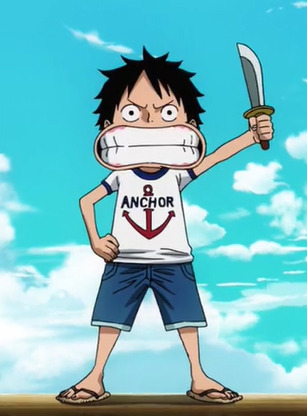
*Disclaimer: I don’t own this image - screenshot from Episode of East Blue
The last time I wrote this, I forgot to hit save and my browser just reloaded the page and lost everything. After that I just went “I’m done” and rage quit Tumblr for the night (which I normally don’t do). That’s how my Sundays usually go😒🥴
Now Onward!
Basic Classifications
Real World Ethnicity/Nationality: Brazilian
Class: farm / country / lower class
Culture (the one he grew up around): Dawn Island - Sea-side village
Fishing community
Farming / Ranching community
Hard work ethic
Small and close community members; relatively friendly; little to non-existent conflict
Selective mix of being open towards strangers (especially with merchant vessels for better trading opportunities) and weariness towards those they expect to be harmful (likes Pirates; I’d imagine the people of Windmill Village were understandably unnerved with the Red-Haired Pirates first showing up).
Core values (personal to Luffy): pride, physical strength, adventures on and outside his home village,
Relation to authority: neutral - shifting slightly towards negative (no clear basis of opinion; can only go off on Luffy’s fascination with pirates as the main viewpoint)
(The added information feels a little scatter-shot but figured I give it a try based on little information from the manga panels and how it lines up with real-world similarities. Most information is based on logical speculation and could change with new information in later chapters.)
I know that the Romance Dawn arc consists of the chapters up until he meets Coby and Alvida (I think...), but the depiction of Luffy’s character in the first chapter seems different from when he is seventeen and setting out to sea. So, I’ll treat kid Luffy as a separate character for the first analysis.
First Impressions and Introduction
Now, I am an anime watcher, first and foremost, so my first impression of this character stems from the Anime. My introduction towards this ball of chaos was when he popped out of a barrel, that he put himself into after realizing that a whirlpool suddenly appeared (how he missed it? - It’s Luffy), and then inexplicably took a nap in. That was the absurd reason I was able to stick with One Piece in the first few arcs (until Baratie became one of the major reasons I stuck with it - I’ll explain why when we get there).
And since the first chapter was used for episode four in the anime, I was already somewhat familiar with how the story started and who Luffy was as a kid. However, reading the first chapter felt....different than what I would’ve expected. And because the anime cut out a few details from the chapter, there definitely are some things to take from kid Luffy at that point.
So my first impression was, as follows:
The kid is unhinged...That explains some things...
Complete wild child of a backwater village from Day 1.
LIKE-- The anime episode DID NOT explain how he got that scar and the guy didn’t bring it up ever. To be fair, that wasn’t a big focus because the anime didn’t make it a focus. Reading that part though did more for his character and a little of his upbringing, through speculation, making it a rather slow-building but also fascinating introduction into this series.
Just a bit of an add-on, but if the manga introduced Luffy in the same level of neutrality as what the Anime did, It may not have fully made it clear if Luffy was going to be the main protagonist. Then again, it’s a shounen manga, maybe it was rather obvious to everyone else. Regardless, his introduction served to
(1) Make his entrance memorable
(2) Establish his character that could either compare or set him apart from his teen self.
(3) Act as a sort of precursor towards the introduction of Luffy’s world and upbringing (which isn’t completely established until the last few arcs of Pre-Time Skip)
Personality
The best way I could describe Luffy at this point is a stereotypical kid...
Energetic, short-tempered, adventure-seeking, easily impressed, and ignorant...
That last description is actually something I brought up in a separate post about the “Fluid themes” of One Piece. Because I found that a small but overarching part in many (almost all) themes and world issues that One Piece reflects has some level of unawareness or apathy. Jimbe put it best during the Fishman Island Flashback when they found Koala (paraphrasing)
“They are afraid of us because they don’t know us.”
Know us referring to acknowledging them as people on the same level as humans.
Because of that and plenty of other instances from the East Blue, it can be a potential center for many characters who go up against or wish to explore the world and find that they are a frog in a well.
And that’s what kid Luffy represents. A rather aggressive frog in a well that wants out.
Granted, he is a seven-year-old, whose schooling has a closer equivalent to the 16th and 17th centuries of our world, living in what appears to be a farming community, so I’d imagine his education only focuses on at least the basic levels of reading/writing, mathematics, etc. A small, unexciting farming village probably has more concerns over their melon crops rather than what the world has going on. Adding in Luffy, you get a kid who dreams about being a pirate and adventuring outside the isolated village, making him avidly interested in a world he has no experience with. Or in a world he thinks is all fun and games.
That’s pretty standard for any child that has a mild and peaceful life. No doubt Shanks and his crew would tell him stories about their adventures. Not as a sort of attempt to make him a pirate, but because he was easily entertained by it, building up this expectation with stereotypical pirate personas. And whether he has his “destructive” tendencies before they became a fixture in Windmill Village, they definitely seemed to amp it up enough for Luffy to try and prove he was “man enough” to be a pirate at seven years old.
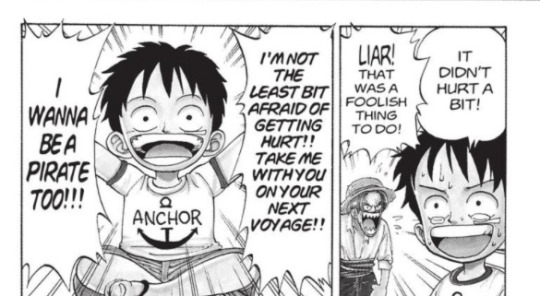
Then when you add in this idealistic expectation with the selfishness of a young child, it creates an opportunity to learn. Because, as any kid may go through, will find that their fantasy of the world won’t be what they expected, and will often react negatively. Luffy’s expectation of Shanks is that he is the strongest man worthy enough to be a pirate.
Now, Luffy’s view of a “real man” stems a lot from this stereotype of men solving their problems through fighting only. Which also embodies this rather damaging philosophy of never running away or backing down from a fight (which I refer to as stupid bravery - something that comes up in a certain other character).
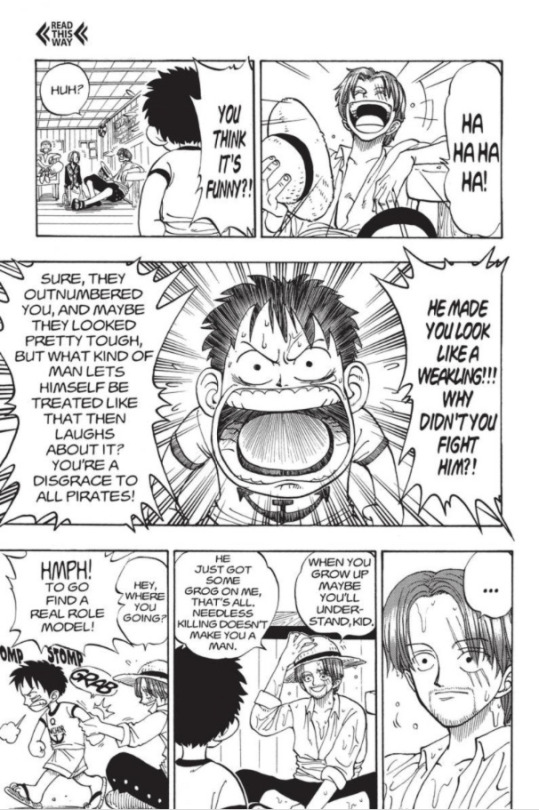
The amazing thing about all the combined aspects of this kid is the ability to create a learning lesson for Luffy. Which can become a motivational factor in his pursuit as a pirate.
His easily impressed nature makes it known both when the Red-Haired Pirates talk positively about piracy adventures and when Shanks leaves the village. The difference between the moments can be showcased by the difference in determination and will to make an effort to achieve his dream. As he declared he wants to be King of The Pirates, he sets himself to work at it, rather than try and go with others.
How He Shapes the Story / World Around Them
I don’t know if anybody else made a similar connection (I wanna say someone DID but I can’t remember where) but in combination with Luffy’s general enthusiasm growing up hearing wild stories, his narrative reminds me so much of Don Quixote De La Mancha.
It’s been a while since I last read that story-- and by read I mean translate some paragraphs from Spanish to English during my Spanish I class in freshman year of high school. Nonetheless, I thoroughly enjoyed the story. Part I entails an old man who, after indulging himself with various stories of knights and valor, decides he wants to partake in his own adventures. Under various delusions and misadventures, his story becomes a rather well-known one.
Don Quixote was called the first “modern book”. That was something my Spanish teacher mentioned regarding its acknowledgment by the world and always stuck with me. It was one of the first stories of the early medieval period to focus on a regular man. Other stories before this tended to be about legends, gods, demigods-- individuals who often were referred to as legends because they were born into high status (often above humans). Either through original texts (often for religious purposes) and then through varying interpretations (such as the Arthurian Legends), these tales were a part of the status quo.
Kid Luffy is a person that reflects so much of the Don Quixote story (And not just because his village has windmills-- the most iconic scene about the knight’s story). He is that simple, normal boy that longs for his own adventures when there seemingly is already a well-talked-about story about someone who achieved infamy. In place of that is a man named Gold Roger whose execution we see in the manga’s opening. At this point, we don’t have much understanding about how it impacts the world as of yet, we just know it is setting up for something significant to the story.
Luffy becomes that “regular” person from a small-town with big expectations for a grand adventure.
That perspective can slowly build into the story by starting in a simple setting with a character going through one of the first dynamic changes in his life. Luffy’s experience with Shanks’s sacrifice sets a course in his own adventure. A story that trails into a rather bonkers adventure at the end of chapter 1.
His development is what shaped his world. It’s the way he learns when as it stems from the consequences of his actions. Especially ones where the smaller ones turn out to be very costly, making it a hard lesson that ingrains into the young kid. His actions created by his old ideologies sparked an intense reaction in the people around him. Especially Shanks, who felt he was worth losing an arm towards.
How The WORLD Shapes HIM
So, for the sake of the fact that kid Luffy’s “World” in Chapter 1 mostly consists of Windmill Village, I’m adding in Shank’s and his crew’s influence to extend and further give credence to his influence. Because, as of this point, Shanks represents a glimpse into the life of a pirate that Luffy strives for.
With Luffy being in a quiet environment all seven years of life, there is growth through basic schooling and healthy child development (theoretically since Makino seems to be the most likely one acting as his guardian), instead of doing things outside that norm. Now Shanks is the odd factor that creates new development into Luffy’s dreams and future ambitions.
The crew’s stories, charisma, and connection towards the kid actively (and probably unintentionally) created a positive expectation if he chose to pursue his dream. While that sounds inspiring, there were also negative aspects. Such as driving his ignorance and impatient nature to seek it out too early in his life.
Shanks then became a mediator. Luffy often has mixed feelings with Shanks as the man begets a level of encouragement while verbally making fun of Luffy for being a kid constantly. Despite that, it doesn’t completely deter Luffy’s ambitions. All it does is slowly drop his high expectations in Shanks after the first bar incident. This is again done by his childish outlook of physical strength and bravery equating to his ideal of a real man.
With Higama, Luffy learns about real-world dangers, and how bravery won’t always be enough to win battles. The same can be said for physical strength but at that moment it doesn’t apply to Luffy.
Shanks’ and the crew’s involvement helped Luffy’s views change. His expectations are fulfilled, which in turn reveal that he was wrong about them.
Finally, seeing Shanks’ sacrifice unfold drove Luffy into a pang of newfound guilt. By then, he was able to change one part of his world views from a childish fantasy into the beginnings of a mature way of thinking.
He gains some level of patience. Along with a set goal to work with. Attributes which are identifiable with Luffy in the chapters last few panels.
Patience = Luffy took time to train and learn to set sail at age seventeen.
Set goal = Be King of the Pirates
Add-Ons
When I say that kid Luffy, after Shanks’ sacrifice, gained a level of patience, it is meant as a deduction during that chapter. By no means am I insinuating that it became a permanent trait for his character. Because as of chapter 1, all of Luffy’s personality has yet to be revealed.
And this will apply to other posts for various characters. They may behave in ways during or in response to a particular event but it doesn’t necessarily equate to that becoming a whole personality trait. Calling Luffy patient, with having full acknowledgment of his personality during the bulk of One Piece, is completely off. But, there can and will be moments where Luffy will act patient when he deems it necessary.
This is a little hard to articulate but I hope it makes enough sense.
🏴☠️🐒
After-Notes
Here’s my first attempt at this analysis. It felt scattered even after editing everything. Breaking down characters sounds easy (and most times it is) but articulating and connecting things takes a lot of work.
Here's to hoping it gets easier with the next character. And maybe shorter paragraphs.
Up Next: Shanks (East Blue)
#OPA#One Piece#East Blue Saga#Romance Dawn Arc#Monkey D. Luffy#Chapter 1#One Piece Characters#Worldbuilding#Analysis
14 notes
·
View notes
Note
Hi, I dont know if you read or know anything about Macchiavelli's "Il principe", but I am studying it in school and I cant help but compare it's fundamentals to how Flint leads. I'm just curious about what you think
Eekekekekekekekekekekkek okay so first off Anon, you are absolutely, 100% right to be getting those vibes. If it’s not actually textual it is at the least meta-textual that Flint ascribes to a very Machiavellian type of leadership. His whole ‘never was there a Caesar who couldn't sing the tune’ speech is...licherally a direct reference to Machiavelli's philosophy that leaders cannot retain their leadership without sacrificing some level of ethical behavior in order to manipulate and deceive their subjects into following them.
And, Flint owns at least two books from thinkers who drew directly on Machiavellian thinking in their texts: De Jure Belli Ac Pacis by Hugo Grotus and The Leviathan by Thomas Hobbes are both visible in Flint’s cabin, and both drew heavily on the type of leadership principles established in books like Il Principe.
(Also, my eternal quest for the book that sits *under* The Leviathan in that scene remains. Y’all I will literally pay someone for this knowledge. My best guess is Plato’s De Republica.)
In fact, the whole system that Flint’s world was operating under at this time was very machiavellian in influence.
Henry VIII, who converted to Protestantism and who would eventually lead England in the conversion from Catholicism to Protestantism that would then in turn eventually lead the country into the War of Spanish Succession(the war being fought during the London 1705 flashbacks), was a student of Machiavellian thinking. He took the teachings of Il Principe to heart and used them to transform his country. Over the next hundred and fifty years, England would change from an entirely Catholic country to a Protestant one. Of note, Catholic scholars generally disagreed with Machiavelli’s principles on the grounds that it did not support the Divine Right of Kings.
As well, the Enlightenment thinkers that influenced Thomas Hamilton(and Flint himself) were starting to argue more for personal liberty and choice of the governed, both concepts presented in Machiavelli’s writings. (For those following along, this approach was also being used to justify slavery, as what was ‘good for the state is good for the man’ was used as justification for everything from impressment to colonization and slavery. Men were willing to set aside their morals for what they justified as good for the state. Shrug emoji.)
As James says of England when he and Thomas view the hanging in London:
“You think Whitehall wants piracy to flourish in the Bahamas?”
“No I don’t think they want it but I think they’re aware of the cost associated with trying to fight it. And I think that that sound travels.”
Here we see that Flint knows what Thomas doesn’t or does not want to accept: that England is willing to sacrifice some morality and some amount of lives(both of pirate-prisoners and the ships they take) in order to save themselves the financial burden of rooting out the causes of piracy. The justification for piracy was that it is too costly to fight, and that the nation ultimately benefits from a bit of strife as it drives prices up and allows England to place within the sights of its citizenry an identifiable enemy. (Note that Blackbeard also argues the same of Nassau, that prosperity ‘made it soft’.)
Even as he is changed by Thomas’ line of thinking, this lesson will stick with Flint and we’ll see it over and over again as he deals with the men’s hatred of himself by redirecting them towards other avenues(Vane, Hornigold, England, etc.)
And in actuality, this is what sets Thomas very much apart from his political brethren - he was *not* willing to sacrifice his morals in order to achieve a ‘more effective’ victory. Once he realizes that moral deficit shown by England, he creates the pardon plan to argue directly for a more moral and just way of governance. His whole premise for the pardons was to show England that an approach that considered the needs and wants of the governed was ultimately more effective, both in cost and in gaining the genuine good will of the people. And again, this is another likely reason why Thomas was then targeted by Peter Ashe and his father. Railing against the entire system of government was dangerous. Particularly if one was railing against the government in a way that could be seen as support of an opposing system of religion and political rule(remember how I said before that Catholics were generally against the Machiavellian systems?) Put plainly, Thomas’ rejection of Machiavelli’s leadership tactics would have been yet another argument for his treason against the crown.
Interestingly also, Marcus Aurelius - Thomas Hamilton’s homeboy - is said to be one of Machiavelli’s five “good” emperors, of whom Machiavelli wrote,
“[they] had no need of praetorian cohorts, or of countless legions to guard them, but were defended by their own good lives, the good-will of their subjects, and the attachment of the Senate.”
How we tryna be.
And so we see that Flint has - not so much fallen back into England’s line of thinking but perhaps that he never really fell out of it. And that this is actually a rift in his potential ability to conform to Thomas’ line of thinking, assuming we see that line as more morally correct. We do see Flint, gradually, throughout the course of the show, move more away from this Machiavellian line of thinking, especially once he meets Madi and the Maroons. And to me at least it’s one of the most important character shifts we see - in contrast to the trajectory of John Silver becoming Long John Silver - throughout the series. Just as Flint is finally starting to really value the lives of those around him, Silver has learned how effective those tactics can be in achieving his goals. As Hands says - ‘I wonder if he knows how much you learned from him.’
And in fact, Silver almost directly quotes Machiavelli at one point when he talks to Flint about their different leadership styles.
“I once thought that to lead men in this world, to be liked was just as good as being feared, and that may very well be true. But to be both liked and feared all at once, is an entirely different state of being in which, I believe, at this moment, I exist alone.”
Whereas Machiavelli in his chapters addressing cruelty and mercy writes
"Here a question arises: whether it is better to be loved than feared, or the reverse. The answer is, of course, that it would be best to be both loved and feared. But since the two rarely come together, anyone compelled to choose will find greater security in being feared than in being loved."
This is clearly the approach Flint has taken - he is the most feared captain on the seas. Certainly in the colonial world and on Nassau, too, his name brings a certain amount of fear with it. Because of this he has been safe from rebellion for quite a long time - however he is also not unaware that his power comes from the people. In the very first episode he talks of his plan with Gates to “position people in all the right places so the crew would never turn.” He has, for an unknown amount of time but I would suspect from the very beginning, been manipulating the crew’s opinion of him to keep them happy. Gates himself, and Silver later, are prime examples.
Both of them; Gates for the first ten years or so and Silver in seasons 2+3 act as a go between - being the ‘liked’ to Flint’s ‘feared’. They convince the crew - the ‘people’ in this case - that Flint’s plans are in their best interest and not truly the act of a tyrant. It is only when Flint forgets - or neglects to respect - that the will of his crew is how he keeps his power, that he really starts to fail. And, later also, that now he has a rival - Silver.
Now, I do want to point out that personally I don’t think Flint is a needlessly cruel ‘ruler’ in the sense the crew sometimes thinks he is, nor is he trying to be as a king is to english subjects. He has power, of course, and he does manipulate, lie, and kill if necessary to maintain his power in accordance with Machiavelli’s principles, but he does not do so ruthlessly or to a degree that is unnecessarily violent, nor with only his own advancement in mind. His goals genuinely are in service of the people he leads, even if the tactics he uses sometimes put them in danger for it. Moreso, I would argue that Flint is a prince who created his own princedom. He took an existing power structure(the pirate council in Blackbeard, Hornigold etc) and took most of the power for himself, either through luck, violence, or political maneuvering. And then he kept it through skill and tactical advantage.
Silver, in contrast to Flint’s new princedom, is truly a ‘prince of the people’. He comes to power through convincing the other pirates that he has their interests at heart - even when he doesn’t. But Silver soon learns that being a well-loved leader is difficult. It isn’t until Silver kills Dufresne and Billy uses that fear to build a legend that ‘Long John Silver’ the pirate king comes into being. Silver learns, just as Flint knew, that in a world or corruption, often leaders need to make sacrifices of things they would have once deemed important.
(I think it’s also important to note for Silver that his main goal is actually one Machiavelli writes of as being ‘a will of the people’. Silver’s main wish is not to rule, not really. His biggest motivator is ‘to be free’. To not have to make choices based on the will or subjugations of others. And so, he attempts to make the leadership forced upon him into something that frees him - unfortunately for him, Madi is right when she says that the ‘Crown is always a burden’ and it would be truly impossible for him to find the kind of freedom he wishes for while wearing it. Which, honestly, is part of why he ultimately fails in that regard as leader of the revolution.)
In the later seasons we see Flint go through this change in philosophy after he meets Madi and the Maroons. He begins to actually value the lives of the people he leads. When put to the choice of going through with the raid on the Underhill estate despite the risk it poses to the slaves on other plantations, Flint resists the idea. As he tells Madi - it would have cost them far more to ignore the ‘will’ of those people he hoped to lead - the slaves - than it would gain them to go through with the plan. And later, even though he can’t be blind to Max’s sway with Eleanor and the others, unlike Billy (and oh how the mighty have fallen, Mr. Bones!) he doesn’t even seem to consider keeping her rather than trading her for the lives of his other men. He no longer wants to trade a potential political victory for the suffering of those he leads. So, too, when he attempts to trade the cache for the fort, he is doing so with the goal being to not have to put those under his power in danger if there is another option. It is, at least to me, an incredibly moving character arc and one that is so very understated.
And honestly, I think it’s what *needed* to happen before he could move on from his rage-hate bender and begin to find the sort of peace that one might argue those ‘good’ rulers had. Machiavelli’s principles tend to get in the way of your ability to connect with other people: when you see them just as pawns in a game, friends and foes lose their intrinsic value of just being important on an emotional level. It is only through learning to truly value his partners that Flint can learn how to be a better and more just leader.
Also, this passage in chapter 15 absolutely KILLS me in regards to both Flint, and Thomas Hamilton:
“Men have imagined republics and principalities that never really existed at all. Yet the way men live is so far removed from the way they ought to live that anyone who abandons what is for what should be pursues his downfall rather than his preservation; for a man who strives after goodness in all his acts is sure to come to ruin, since there are so many men who are not good.”
Like bitch!! We get it!! Too much sanity!!! Shut up!!!!!
Anyway, all this to say that you’re absolutely right in seeing parallels between Flint’s style of leadership and a Machiavellian prince - he is absolutely written as a prince-like leader. As are Silver, Rogers, even the Maroon Queen(and Scott and Madi as extensions of her) can be compared to certain rulers in Machiavelli’s archetypes. Even Thomas, who models himself after one of those ‘good emperors’ engenders a type of political leader Machiavelli writes about.
(Also lastly, i want to very quickly point out this guy, Cesare Borgia:
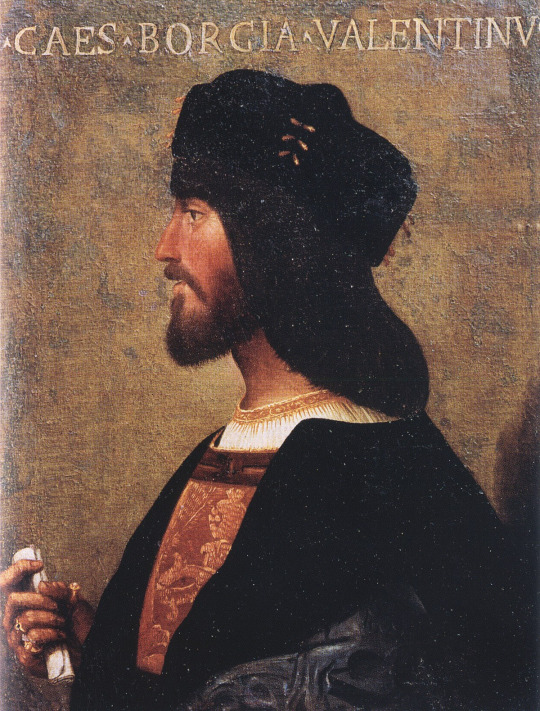
Who was a prince of ‘fortune’ who lost his princedom to trusting the wrong person. What a beard, amirite? What a face. He’s even got the rings! I’m sure this means nothing.)
So basically yeah, Flint is absolutely a Machiavelli bitch.
#anyway talk dirty morally grey philosophy to me!!!#black sails#james mcgraw#captain flint#machiavelli#black sails meta#milos black sails meta#long post#Anonymous
43 notes
·
View notes
Text
Civilization is coming: “Black Sails” and when rage is justified
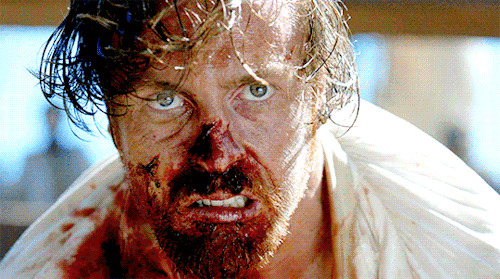
(SPOILERS ahead! You’ve been warned...)
There’s a moment late in the first episode of the highly underappreciated series “Black Sails” that hints not only at the troubled past of its lead character Captain Flint but also describes the larger theme of the story.
Flint has gotten himself into trouble. Along with his crewmember Billy “Bones,” in an effort to secure the financing he needs to capture the gold from the Spanish warship known as L’Urca de Lima, his recklessness has gotten Nassau’s governor shot and injured and his plans all but evaporated. Billy feels they are now in too deep and they should not only turn back but perhaps new leadership is needed for Flint’s crew. It is here that Flint reveals a bit where his true ambitions lie.
youtube
(Toby Stephens, ladies and gentlemen.)
On the first viewing, Flint ominously declaring the pending arrival of “civilization” to the new world could mean anything from simply the imperialistic tendencies of the British and Spanish empire, to the draconian rulership of the crown or just “taxes” as he makes light mention of in this speech. But as the series progresses, especially in the second season, “civilization” begins to take a darker, more personal meaning.
The story begins to reveal that the dangerous pirates of Nassau are not at least inherently dastardly, although certainly violent, but victims of their various circumstances; a former slave turned prostitute turned keeper of secrets in Max, a neglected daughter becoming the bookkeeper of the pirates with Eleanor Guthrie, another former slave turned ruthless pirate captain in the vicious Charles Vane, and an abused woman turned deadliest pirate on the island Anne Bony, and none more painfully revealing than that of Flint himself.
You see Flint didn’t always go by this name, he used to be a prominent officer in the British navy named James McGraw until he met Thomas Hamilton, a wealthy proprietor tasked with solving the problem of the pirates of Nassau many years prior. Thomas had the radical idea of pardoning the entire island to bring them back into society, to avoid violence and bloodshed, and to better understand the people who would turn to piracy.
As James gets to know him more and his revolutionary philosophies of empathy and enlightenment the two unexpectedly fall in love and thus seal the fates of both their downfalls from “civilized” society.
With England unwilling to see any other way to end the pirates without exterminating all of them and looking to exploit weaknesses in Thomas to Parliament, he is outed and imprisoned. James along with Thomas’s wife Miranda, who lives in a polyamorous relationship between the two, are persona non-grata-ed and the two flee to Nassau to finish what Thomas started in an act of rebellion.
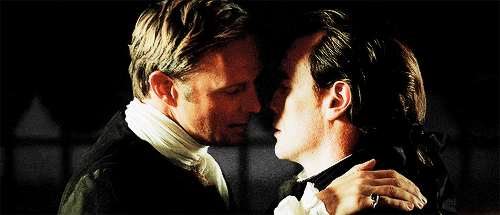
(This is seriously one of the most heart-wrenching, tragic reveals I have ever seen on TV. I totally knew it was coming at the time and I was still not prepared for how it was delivered.)
There are few things as personal as love and “Black Sails” uses this to show how far society can go to villainize people. Flint wasn’t born a monster, and he is not one for loving Thomas; he is a monster because “civilization” wanted him to be one.
As our own civilization enters a timeline that may promise great change, people who have been othered and victimized by society are finding themselves grappling with their pain and grief in the same way as Flint. People have tried peaceful reconciliation and conformity into society to avoid violence throughout history despite the labels they have been given for no other crime than being who they are, but civilization’s need for a monster always brings people down no matter how hard they try to do it the “right way.”

(Tell me if you see a justice system in this picture that looks interested in listening...)
Native Americans tried playing by the white man’s rules when America began moving west. Compromising over and over again and yet they were killed and still killed and neglected today for it.
African Americans tried becoming rich like their white counterparts in places like “Black Wallstreet” in Tulsa, Oklahoma and were still bombed and massacred for it.
Asian and Latin Americans immigrated here to flee war and death largely caused by white imperialist countries, to survive and work jobs white Americans would not. Both are othered as foreigners, face violence from the state, and are deported everyday.
Poor working-class Americans try fruitlessly to keep their head above water as they become mired in debt, fighting a pandemic on slave wages essentially, all while our government cuts wealthy companies a fat paycheck annually with our own tax dollars. And anyone who fights back finds themselves without an income and health insurance during a recession and a pandemic.
And the LGBTQ+ community ask for the dignity to be left alone and treated normally but not only are they harassed for it but they are beaten, tortured, and killed for being different.

(Remember, Stonewall was a riot.)
Flint, himself, tries one last time, toward the end of season two, to peacefully resolve his vendetta with England and save Nassau from a war with them but instead finds himself facing the gallows anyways by the Charlestown government.
As they read out his charges, many of them real heinous things he did but also many that were fabricated, Flint stops them from proceeding any further and delivers a final act of defiance to the court.
“I have one regret,” he begins to the court of high society folks who are only interested in seeing him punished before the masses. “I regret ever coming to this place with the assumption that a reconciliation could be found. That reason could be a bridge between us. Everyone is a monster to someone. Since you are so convinced that I am yours, I will be it.”
It is at this point in the story that Flint, perhaps like other revolutionaries of the past, recognize that the system doesn’t want to reason with him, that these people aren’t looking to understand or empathize with him or even try for that matter. They wanted a monster, they made one in him, so he decides there that “civilization” as he had noted in the series first episode is not worth reconciling with and certainly not worthy of forgiveness.
And Flint spends the rest of the series in bloody war with them.
youtube
(From season 3. Again Toby Stephens, ladies and gentlemen)
“Black Sails” is about queerness, race, social politics, and the way conformity by force is used against it. It’s about the rage that boils underneath many of us as we are wronged over and over again by society, while being exploited to no end, and what happens when someone finally says “enough.”
Anyone who has experienced what it is like to be othered can find something deeply personal with the anger that Flint carries around with him in each scene of this series. We feel his pain of rejection by society, his grief for feeling ashamed of himself when he and the audience know he shouldn’t.
It's what makes the eventual reveal of his relationship with Thomas so cathartic, as we see the rage-filled guard of Flint drop as he reads Thomas’s words left for him in a book they both loved and shared.
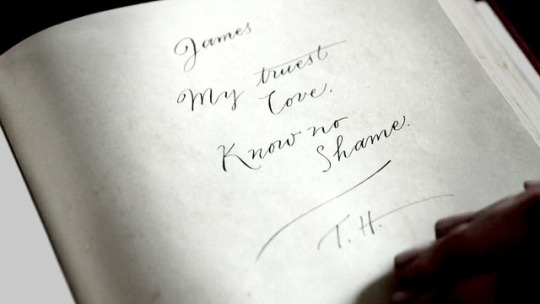
(Again, I cannot emphasize enough how much of a gut-punch this reveal was watching this...)
"Know no shame” is so important to growth of this character and the message of this story. Civilization and those who wish to keep the status quo want those who do not fall in line with their authority and judgments to feel shame for who they are. They not only want monsters, they want you to feel like one and the reason Thomas line speaks so much to both Flint and the audience is that it reminds us there is no shame in who we are.
The country we live in is a powder keg right now experiencing the same rage that Flint feels and more specifically how he felt at the end of season 2. Though this country’s racist attitudes and subjugation of the vulnerable hardly started with this presidency it cannot be argued that it has brought all that hatred in our government and the people who support those views painfully to the surface. When people peacefully protest, peacefully assemble, and peacefully try to cast their vote and are still met with resistance, still met with hatred and violence, people have to start to wonder if operating within the system’s rules can actually affect change.
A lot has been made about the way protesters may have violently lashed out over the past three weeks, with media talking heads and privileged elites asking unironically why they couldn’t do things peacefully but more has been done as result of the rising tension than the previous 50 years combined. You can tell people to “#vote” all you want but it doesn’t change the fact that people have been trying that for decades and people are still getting quite literally killed for it.
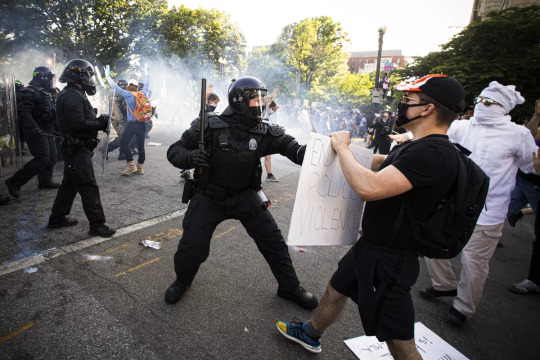
(Again, I gotta ask, who is this protecting? Who is this serving?)
If there’s one takeaway I hope a viewer gets from “Black Sails” is that revolution, no matter how serious you are about it, should never be off the table when confronting systemic inequality. A racist, sexist, classist, and/or, in the case of Flint, homophobic power structure does not concede their power if you play to their convenience and when people are being put down, beaten, and often killed for showing their anger at this, calling for “law and order” becomes a slap in the face to the victims.
A government or system that treats you unjustly doesn’t deserve peace.
I’ll say it again.
A government or system that treats you unjustly doesn’t deserve peace.
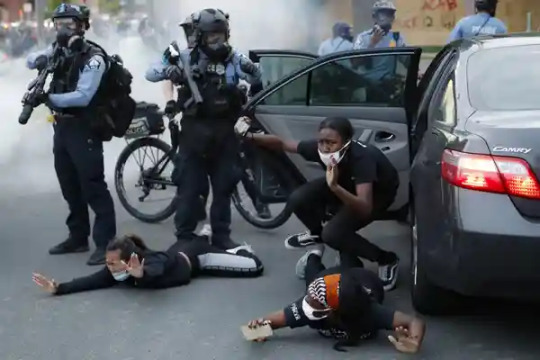
No one wants it to get this far, I definitely don’t, and certainly not every peaceful mean has been exhausted yet in this fight perhaps but this country was literally founded on violent rebellion after being slighted all the same by out of balance power structures. I’m not advocating for violence or to take up arms against the state right now BUT no one should ever rule it out when the social contract keeps being broken and broken and broken again by those in charge who clearly don’t want to listen.
A government should always feel the threat of an uprising if it keeps wronging its people.
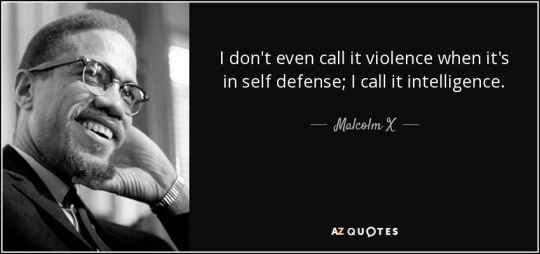
(See my blog post about “Do the Right Thing” if you need help understanding this quote.)
As the more fiery weeks of the protests seem to be in the rearview mirror and we find less activity and calls to action on our social media timelines, I want to remind you all to not let up with whatever you are choosing to do to help and keep fighting back out there. The people who stand to benefit from having angst of the general public leave and dissipate from our collective consciousness want us to forget how angry we are, they want us to feel fatigued and disinterested in continuing the push forward because “this is how they win” as Flint would say.
youtube
(Again, Toby Fucking Stephens, everyone.)
We have so much more power than we realize, just look at how much got done just by everyone uniting behind one marginalized group finally over the past three weeks. When we realize we are fighting essentially in the same battle for respect and dignity, justice in our society can be achieved. It can be done, and maybe just maybe we can finally change the world. Afterall who else has been as close to achieving it as we are right now?
Fight for your dignity and respect and stand in solidarity with others in their own fights as well, and always remember “know no shame.”

Raise the colors and Happy Pride, everyone! (credit: Luluxa on Tumblr)
#Black Sails#Starz#happy pride 🌈#Pride Month#LGBTQ#LGBT#Stonewall#George Floyd#Police Brutality#BLM#Black Lives Matter#Tulsa#Black Wallstreet#Pirates#Toby Stephens#film#TV#movies#protest#protests#pride march#revolution#rage against the machine#do the right thing#Spike Lee
62 notes
·
View notes
Text
A Long Post about Disney Plus
(Disclaimer: The following is a non-profit unprofessional blog post written by an unprofessional blog poster. All purported facts and statement are little more than the subjective, biased opinion of said blog poster. In other words, don’t take anything I say too seriously.)
A Long Post about Disney Plus

UPDATE: Movies such as Dumbo and The Lady and the Tramp have not been altered from their original content but instead include a disclaimer stating the movie may contain "outdated cultural depictions". Toy Story 2 still does not have the Stinky Pete scene. The episode "Stark Raving Dad" of the Simpsons is NOT on the platform.
So, the almighty Disney Corporation, aka, that giant conglomerate that has bought Marvel Studios, 20th Century Fox and Star Wars, is planning to release Disney Plus, a streaming service that has multiple shows, movies and original content under the Disney Banner.
And frankly, I’m a bit… worried.
Let me start off by saying, I’m not here to criticize you, the reader and potential consumer. However you want to spend your money is your business. If you wish to boycott Disney out of some personal philosophy or ideology or whatever reason, that’s your business. I’m not here to dictate how you spend your cash.
I would, however, like offer a humble suggestion before you decide to dive in head first into a potentially disastrous scenario.
So, Disney Plus is a streaming service that promises to provide lots of content to potential subscribers and let them view whatever content for a subscription. Obviously, this is Disney’s response and plan to combat other streaming services such as Netflix, HBOMax, Apple TV Plus and so on and so forth. While Streaming services aren’t nothing new, the addition of the Disney brand as well as the multiple Intellectual Properties under its umbrella.
What worries me is where both Disney and its potential customers go from here.
There’s already early reports of certain franchises being put “behind the Disney Vault” aka “We’re not rereleasing these films”. For example, the Aliens Franchise is apparently being one of those films.
www.alien-covenant.com/news/di…
However, Alien and other Fox properties will still be locked away in an effort to combat independent theaters and chains from profiting by screening those classic films.
Other reports indicate that certain films will be censored or excluded from the platform entirely. For example, the Siamese Cats from “The Lady and the Tramp” or Jim Crow from Dumbo will be cut out of their respective films entirely (and would explain why Disney is so keen on doing a live action remake of the Lady and the Tramp). Another case would be a Toy Story 2 after credits scene where in Stinky Pete is flirting with some Barbie Dolls and promising them parts for Toy Story 3.
boundingintocomics.com/2019/11…
CNBC also reports that Disney will remove its Jim Crow character from Dumbo.
“The Jim Crow character from the original “Dumbo” will be edited out of the film version that appears on the streaming service.”
This also isn’t new news. Boardwalk Times noted the scene would be changed back in April.
They reported at the time:
“The Jim Crow scene in 1941’s Dumbo will also be edited out for the digital library that launches November 12.”
The scene was also removed for the recent live-action Dumbo remake from director Tim Burton as well.
CNBC also reports a post-credit scene from Toy Story 2 featuring Stinky Pete will also be removed from the film on Disney+.
The scene sees Stinky Pete appearing to seduce two Barbie dolls and promises he can get them roles in Toy Story 3.
youtube
Obviously, this is all legal. Disney owns the rights to the properties and they want to have a clean 21st Progressive Identity to hide behind. Besides, I suspected that “Song of the South” was never going to be on the platform.
But this is part of the same problem that everyone, even the most vocal Anti-Disney people, seem to be overlooking.
In which we, the consumer, are trading a product in favor of a service.
What I mean is that because of the success of things like Netflix, Hulu, Youtube, etc., too many of us have gotten used to the idea that we need to pay a subscription for digital access instead of paying a flat rate for a product. That’s NOT a good sign.
The debate of whether exclusive content such as the Original Series, The Mandalorian, is worth the price of admission or whether streaming services are necessary in the age of digital piracy are one thing, but in the age of dubious ownership and the doing away of physical content, ownership still matters.
It all goes back to one thing; when you subscribe to a service to access your content, the people you pay have the right to revoke your service and keep your money. That’s not a good thing regardless of political ideology. And while it’s tempting for PC gamers to pay for what amounts to a digital license to be onboard the same ship, the fact is having all that content tied to one account risks the danger of losing all that data if you should lose access to your account.
I’m a firm believer of owning physical media. For example, I own a Blu Ray of Assassination Classroom. No matter what I say or do online, I don’t have to be afraid of Chris Sabat kicking down my door and taking my Blu-ray away from me (or, at least, I shouldn’t have to…). Because when I buy a physical product, it’s mine as long as I don’t lose it or it isn’t damaged.
But a subscription (and to a lesser extent, a digital license) can be lost really easily. Even if I were to take extra good care of my account and prevent people from hacking it, guess what? The people who make the content can revoke access.
Remember Minecraft: The Telltale Series? Interesting story. See, when Telltale when bankrupt, one of the games they had made, Minecraft, would no longer be accessible or downloadable from digital platforms, even to those who held the license.
Can you imagine what kind terrifying precedent that sets? Keep a movie or show permanently downloaded onto your storage or lose access to it forever? We’re dealing with a system that makes it so that you don’t own the stuff you paid for now!
Owning a product gives me a plethora of options. It allows me to keep it, re-watch it, lend it to someone else or, if I decide to hock it for drinking money, sell it. It’s not perfect, but it’s preferable to having something that I paid for as opposed to having nothing. My loyalty to whatever company makes said product ends with a transaction (a transaction that can be easily outmaneuvered through a 3rd party purchase or sale). With a service, you can’t help but be loyal to said company.
If I start badmouthing Disney and Disney decides to deny me access to my subscription, my account or my digital licenses, guess what? I’m up a particularly smelly creek without a paddle.
I doubt Disney will go that far and will adopt a similar strategy to Funimation, as in they give digital vouchers for their Blu-ray series but it’s only redeemable on Disney Plus the same way digital vouchers from Funimation Blu-rays are only redeemable on its streaming service, FunimationNow. I also understand the economic argument in which lots of lower income families cannot afford specific shows and just want a plethora of options. But I know a step in the wrong direction when I see one and with stuff like Kevin Feige saying true Marvel fans must subscribe to said service or Disney saying Disney Plus subscribers will have early access to Frozen 2 or Captain Marvel, the case is there.
youtube
This is what happened to things like Dumbo and Lady and the Tramp and Toy Story 2. When you don’t own a physical content of your media, you’re at the whims of a corporation that can alter it whenever they want.
We all have different opinions when it comes to taste or entertainment. But whatever your feelings on the Disney corporation, whether you think of Kathleen Kennedy’s leadership of the Star Wars franchise, whether you thought the Last Jedi was a piece of junk, whatever you feel about Disney’s relationship with China, one thing is certain.
When you buy a product, you own that product. When you buy a service, the service owns you.
134 notes
·
View notes